#but showing his face in season 1 would undermine the impact of that moment a lot in my opinion
Text
actually the only good unhelmeting of a masked character is if they have a smaller identical helmet underneath the first one
#i have to go vacuum the entire apartment or something so i stop going insane thinking about the mandalorian now#i DONT want to SEE#the only exception to this is that i hear season 2 has an entire episode where he's got his face out bc he HAS TO for plot reasons#and i guess he looks really upset the entire time#which is like.#i mean i haven't seen it yet so take this with several grains of salt#but i think that could be good#but i think taking the helmet off in s1 undermines it too#like building up this belief that it's reallyyyy important to him to NOT show his face to ANYONE and then exploring what it would take to#get him to break that rule. could be really interesting and good#and having him look really uncomfortable and building it up in such a way that the audience also feels really uncomfortable the entire time#until he puts it back on#i think that could be REALLY GOOD#but showing his face in season 1 would undermine the impact of that moment a lot in my opinion#i need to stop going crazy over an episode i haven't even seen. but auagahaahahhhh the season 1 face reveal drives me up the wall WHY did#they DO THAT#you have fancy camera angles at your disposal and you did not have to show US#he was showing THAT DROID because it wasnt a quote-unquote living thing. he was not showing EVERYONE#anyway. im normal and im gonna vacuum now.#my post#this unhinged raving is why i made a star wars sideblog and y et here it is on my main for all to see.#woe. my star wars opinions be upon ye
7 notes
·
View notes
Text
Both @justagibbsgirl and @i-run-with-scissors39 made a really good point about the Gibbs absence in the Ducky tribute episode- if we'd had a funeral scene, we would've gotten a much deeper emotional impact from a eulogy, the camera could've panned the gathered guests to show a myriad of former characters we've missed over the years, AND, they could've shown Gibbs in the back, unseen by the guests, paying silent tribute to Ducky. Brian Dietzen said Mark Harmon didn't come back because of 'scheduling conflicts', but as @i-run-with-scissors39 said, they could've filmed it separately at any time, because it would've just been him.
But none of this happened. In fact, what really happened in that episode that was memorable? Besides Tony showing up. (I'll get back to that in a minute.) McGee had 1 flashback, Vance had 1 flashback and Jimmy had 4. Jimmy also had the most screen time and was given the most emotional scenes. A lot of that is understandable- he was the only one left with the strongest connection to Ducky. But there were other people with connections to him, too. And we didn't get to see that. The only person outside of the regular cast of season 21 to show up was Tony. I mean, think about that, just for a second. No character outside of the current squad showed up. Not even Tobias! Instead, they handwaved the work/money (?) involved to make something more meaningful happen by showing flowers and Polaroids.
Even the Crime of the Day fell flat. So some girl we've never met is getting hassled by her college because her dead dad's getting slandered in the press by a senator. A senator who, I guess didn't get arrested at the end? Just stepped down from his position? Why did the senator pick that Marine anyway? (I know he served with him, but what was the point in naming that particular Marine?) And if I see one more reference to someone gifting someone a scholarship fund, I don't know if I'll be able to unroll my eyes. And yes, I know the MCSF was a big thing for David McCallum, so it made sense in this context, but the fact there's a Leroy Jethro Gibbs Scholarship Fund joke almost undermined the whole thing. (Would've been nice if they'd had a link at the end of the episode to the MCSF.)
Instead of this random girl and her dead dad, how about a cold case Ducky was working on? Maybe Jimmy sees it on Ducky's desk (or finds it in the secret spot behind a picture /eyeroll) and decides he's going to solve it. The team wants to help but are sceptical it can be done, but Jimmy's absolutely determined to do it, to the point of almost obsession. It would be his way of putting off dealing with Ducky's death while also making one last connection with him. They end up solving it because one of the flashbacks gives an indirect clue. You know, like Ducky's cryptic message to the team about where to find the nothing file behind the photo in his office. /eyeroll again
I loved the fact that Jimmy never took off his lab coat, even though he didn't do any lab work the entire episode. Him walking around the bullpen in his lab coat solving a case was just... well, I guess that's where the show is now, yeah? Sean Murray didn't want to step forward as the face of the show, so Brian Dietzen did. And you know what? Good for him. It's a hell of an arc over 20 years for him. But whether he meant to or not, he ended up making this episode about him. Every emotional thread went through Jimmy; every emotional moment was Jimmy's. When Diona Reasonover's voice cracked in the bullpen ("Any suggestions as to how to do that?"), it felt like the only real moment given to anyone other than Jimmy. Probably because 3 of the team didn't really know Ducky, so they could only experience the loss through other characters. It's why we got Knight reading Ducky's journal to bring up a Gibbs flashback, and it's why Torres did the same with McGee. It's why Parker was in charge of the flowers or something. And I try to remember they're new when I hear Knight say, "Dying quietly in your sleep isn't the worst way to go." JFC, lady.
I dunno. Kate was on for 2 years and I felt the show handled her death with so much more emotion. Her loss rippled through the team and we felt it because we saw the characters feel it. The Ducky episode was a lot of telling rather than showing, and what showing they did was through Jimmy instead of a handful of the hundreds of people whose lives Ducky touched in 20 years.
Oh, and Tony. Great to see one of the Originals, and Tony, in small doses, can bring the depth the scene needs. But being tacked onto the end of the episode made it fell exactly what it was- a surprise cameo to wow the fans rather than a true nod of respect to Ducky/David.
It should've been more. It could've been more.
21 notes
·
View notes
Text
Fix it’s for Teen Wolf
I can think of a few things that would have made Teen Wolf better.
1. I wanted more focus on Scott’s emotional response to what happened to him. I don’t mind that Scott isn’t the type who complains about getting hurt. The problem for me was that the show rarely dealt with the consequences of Scott’s pain, and thus to the casual viewer often made it look like he simply didn’t mind, that being hurt didn’t bother him at all. Or worse, that nothing all that bad had happened in the first place.
Doing this undermined many of the hallucination scenes. For example, in Season 2’s Party Guessed, we get hallucinations for Stiles, Jackson, and Allison which give us a view into psychology, letting us know their issues without spelling them out. For Scott, we got Allison making out with kanima Jackson. Compared to the others, it felt shallow and confusing. The writers couldn’t even bother to give us dialog. He received the same treatment in Season 5, when they read the book designed to trigger their memories about the Dread Doctors. Stiles gets yet another scene about his dead mother who has been crucial to his story since Season 1. Lydia sees her grandmother and her connection to both Lydia’s powers and Eichen House, as well as foreshadowing her treatment at the hands of Valack. Malia about her Mom and sister’s death at the hands of the Desert Wolf, which is her entire arc. And Scott? He gets a nightmare about a dog that was never mentioned before and would not be mentioned after.
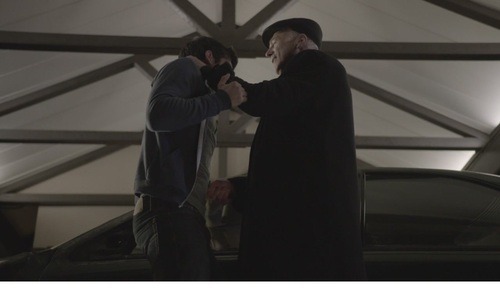
2. I wanted more focus on Scott’s trauma in general. In Season 1, Scott was repeatedly mentally and physically violated by Peter, terrorized and abused by Derek, and hunted by the Argents, and it was taken as a given. Even the recaps at the beginning episodes in other seasons barely show any of that. For example, Gerard attacking Scott in clear view at the hospital, stabbing him, and threatening his mother, never appeared in any of the recaps, even in episodes where it would have been important to remind the viewers about it.
While the show had no issue showing us over and over again how Stiles or Derek or Isaac or Allison or any white character really was hurt, they did not focus on the pain Scott was put through, and thus let the viewers conclude that those events didn’t matter.
The show literally had Scott try and kill himself, twice in less than two days, first in Frayed, by refusing to let himself heal, and then again in Motel California, yet neither of those suicide attempts are mentioned even once afterwards. And this while it would have been a good call back in s5b, when Scott is once again not letting himself heal after Theo killed him. and yet again, no mention whatsoever.
3. I wanted more consequences for certain characters. I liked that Scott and to a lesser extent Derek were confronted with the consequences of their actions. When they screwed up, they got called out on it. When they did something wrong, it wasn’t excused. Then they made up for it.
In contrast, certain characters, especially Stiles, got to do whatever they wanted and it was either dismissed as funny or used to make them look sympathetic. Stiles got to be mean and cruel, and the narrative still treated him as if he were the best friend ever. He got to assault people, hurt them, and it was treated as if somehow he was the victim.
For example, I would have liked Stiles a lot better, if when he tortured Scott with lacrosse balls, punishing him for who-knows-what, if someone else had called him out on it or if Scott had got to defend himself, instead of just taking it because Stiles was angry. Scott allowing Stiles to hurt him to maintain their friendship was a pattern between them, just as much as Scott taking responsibility for things that aren’t his fault. He keeps on doing it over the course of the show, but it would have been nice if the show at the very least had made it clear that that didn’t make Stiles behavior acceptable.
Just like I wish that Peter had actually faced consequences for his actions – and/or shown some kind of true remorse for his misdeeds--instead of the others just letting him hang around after all the horrible things he’d done or reduce it pettiness.
4. I would have liked more time spent on Melissa and the McCall family in general, especially on Melissa’s initial reaction to Scott being a werewolf. In the show, they barely spent two minutes total on Melissa’s reaction to finding out her son has been turned into a werewolf. By the end of s6b, she was barely even behaving like a mother anymore. Even to the point where we don’t even get a conversation between her and Chris about his attacks on her son before the two of them start dating. Now don’t get me wrong, I liked Chris and Melissa in a relationship, but it was missed opportunity to humanize both her and Scott that they didn’t bother to show her finding out about that and her reaction to it.
Instead we got the whole horror reaction, of her being horrified at seeing her son’s other face, the reaction that any LGBT kid fears when they come out to their parent. Which could have been a great metaphor, especially if they had then made it clear that Scott was bisexual.
5. I would have liked more focus on Boyd. The production time spent on Isaac and Erica, while Boyd’s arc was treated as almost an afterthought. We barely even got any hint on his past, in the episode before they killed him off. They started out with Boyd as the one who wanted to be like Scott, and then never explained it. Why not focus more on that, and their relationship?
(similar complaints go about Mason, and how little we knew about Mason, outside of him being Liam’s friend. Like... what was his relationship like with his parents? What is Mason interested in, what does he want to do with his life... how did he deal with the after effects of the Beast...
6. I would have liked more focus on Alan Deaton. The show had such huge potential with this character’s backstory, not just with the Hales but as an emissary in general. There was this whole mythology about druids that they barely even delved into.
To not even start on how little we knew about his personal life? Why did he and his sister have different last names? What was their relationship like?
Does he have any romantic relationships? Friendships, relationships in general?
Or how about more time spent on his role as a father figure to Scott, we got so few crumbs of their relationship when we should have gotten so much more
7. I would have liked more focus on Scott and Theo’s interaction in Season 6. I get that in 6a, they had Scott primarily focused on getting Stiles back, but I’ll never understand why they then didn’t use 6b, to deal with the fact that Theo had tried to murder Scott and was trying to make it up to him and the pack for what he’d done to Scott and the others.
I don’t mind Theo interacting with Liam. Those scenes were great, but they should have at least one scene with Scott and Theo dealing with the issues between them. For Theo’s sake, as much as Scott’s.
8. I would have liked a complete rework of Season 6A in its entirety. If you’re going to focus a season on an actor who isn’t available, then you have to make it about his impact on the others. Show us what difference this character made, by showing us the effects of his absence, rather than just try and make it about a romantic ship. (I’ve written a post about this already in greater detail, so limiting it to that, but seriously, that season was such a huge wasted opportunity.)
9. Actual character growth for Stiles. For a character who had as much screentime as Stiles did, it’s shocking just how little character growth Stiles had over the course of the entire show. This contrasts in a really bad way, when you look at how much every single other character grew and changed over the course of the show.
Just look at the last four episodes of 5b, to give an example. After almost an entire season of watching Stiles at his worst, focusing on emotional scene after emotional scene with him, he suddenly got relegated to comic relief. Why? Because they didn’t want Stiles to grow, because unless he grew, there was no way for him to go but down. If Stiles had taken responsibility for his actions, then they’d have had to admit that he did wrong in the first place. And they couldn’t have that happen.
10. And last but not least. More moments of the kids being kids. Even if it’s just proms and beach parties. Moments where we see the characters spend time together, when they aren’t trying to stop some bad guy. Where we can see them be friends, hang out with kids their own age. Even just to remind the audience just how young these children are. And where the viewers along with the characters can rest in between the horror, because doing so makes the horror hit far more strongly in contrast to the light.
11. Also, a better lighting budget, pretty please Davies, were a few more light bulbs that much to ask for?
#teen wolf#scott mccall#anti stiles#teen wolf fandom problems#alan deaton#vernon boyd#mason hewitt#theo raeken#melissa mccall#anti peter hale
119 notes
·
View notes
Text
Lost Tomb Reboot aka Reunion: The Sound of Providence Season 2
I swear I wasn’t actually planning to write this thing, instead just opting for random picture spams of the season, starting with every time this show got Zhu Yilong’s Wu Xie wet, because that was a trend I had not expected and kind of lived for.
All that will still happen eventually, but here’s also my five cents on the season, because it is very very important for you to know just how worthy of love it is.
You see, Season 1 was silly and fun, and definitely, undeniably, enjoyable.
Then Season 2 swooped in, and completely won my heart. I cannot even express how much I adored it. Everything about this show is extremely extra in the best possible way; it is likely to have been the most charmingly over the top thing I have ever seen.
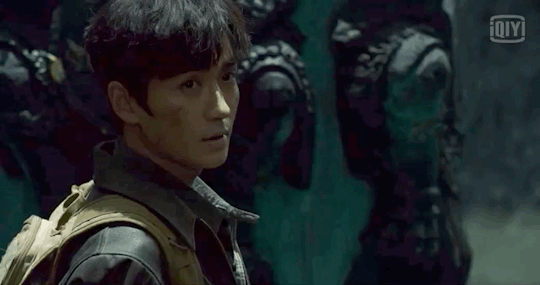
(Vague spoilers for : specific monsters, narratively significant moments, fate of the certain characters, including the protagonist.)
Some of it comes from the pace, which speeds up dramatically early in the season, and only slows down marginally to allow characters some breathing room. It’s not just gripping because it makes you want to hit play on the next episode, it also keeps you engaged because you can’t wait to see how the next wild set of events may be resolved and then topped. At about episode ten I was questioning how they could possibly produce a sense of further escalation. At episode twenty, I was wondering if anything can top dramatic impact of whatever was occurring only two thirds of the way through the season.
I need not have worried: every single incredible character moment, every mind-boggling turn of the plot, every single bizarre threat would be blown out of water by the next one.
Partly, this seemingly has to do with the writers attempts to ground the material. I am not sure what the novel contained, but I can discern that it was something along the lines of ghosts, ghouls and various supernatural circumstance. But when you are told “this is a curse”, your reaction is naturally to go, “ah okay, so curses are a thing, and this is one of them, gotcha”. When you are told, “this is a heavy metal poisoning combined with a neurotoxin affecting the victim’s central nervous system and making them violently hallucinate”, your reaction is to question whether this is how metals, toxins, poisons, or, indeed, central nervous systems work in any version of reality.
The show does this a lot. From human shaped swarms of killer moths, to flying brain-penetrating eels, to probably my favourite monster of the moment: the murder clams.
Seriously, I cannot stress enough that this show has murder clams. They move with their clam mussels. They jump with their clam shells. They will murder you in cold blood.
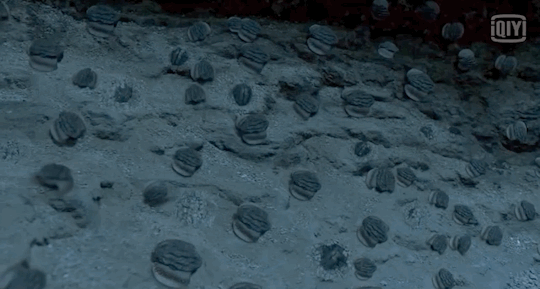
There are ancient “laser corridor” style set-ups, there are shapes made out of fog recording its memory, there are group hallucinations generated by the sound of thunder, there are Mission Impossible style full face masks. There is a character who walked off a gun wound and sarin gas poisoning in order to die in the arms of his lover who looks like his dead sister. And by “looks like” I mean, “played by the same actress”.
There is a whole character of Doctor Churros, who saves our hero from imminent death by washing his lungs with oil.
This, I suppose, ultimately, is how The Lost Tomb Reboot (Season 2 in particular) lures you in. It turns what I saw as the show’s fault in season 1 into its biggest strength by establishing the world in which nothing is too outlandish and everything is possible. It so thoroughly breaks your expectations barometer, you grow to willingly accept whatever is thrown at you.
The most beautiful thing about all of it, is that the fun and games and moments of barely controlled hysteria do not lower the stakes whatsoever. Moreover, somehow this show makes me believe that it could just about do something as irrevocable as, perhaps, killing off the protagonist
You know how you can watch, say, a super hero film, and then the “all is lost” moment happens, and you kind of have to struggle to care because you know that they will pull through. It’s curious to see how that happens, but you don’t doubt for even second that it will. Well, when that moment arrived here, I found myself between ugly sobbing, and going into speculation overdrive to try and figure out how the Reboot would deal with that. By then I have seen that show be an high octave action movie, a supernatural mystery, a horror thriller, a buddy comedy and a spy flick: it was not a massive stretch to imagine it turning into a revenge tragedy.
Wu Xie dying had been building up since episode one, so you had hours and hours and oh-so-many hours to brace for it, and when the tragedy does not strike, the relief is visceral.
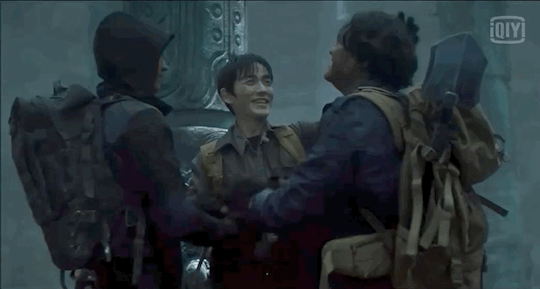
Despite all the moments of hilarity (whether intended or otherwise), despite the chaotic turns of the plot, despite how utterly off the charts this show is tonally, when it matters, the narrative is pulled together in a way which not only makes complete sense within the world of the series, but is meticulously set-up, satisfying resolved, and delivers lovely emotional impact. Considering that the moral of the story is a very common “live in the moment”, paired up with “greed is bad”, it was surprising how much resonance its delivery actually created.
Ultimately, however, this show is about found family, and, more specifically, about Wu Xie’s ability to create this family for himself and for every single member of it. He starts as one of the trio, and ends as one of a large group of old allies, new friends, and people he has graced with so much kindness that they follow him until the bitter end.
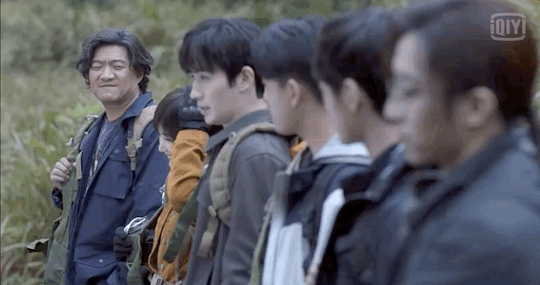
Lost Tomb Reboot ensures that you get to know them all, and it’s pretty damn hard to not love this misfit group of adventurers in its entirety.
(The only thing I could say is that I wish the series spent more time making sure the viewer knows and likes Zhang Qiling, but it seemingly had little purpose for him apart form sweeping in as an avenging angel every now and then. I get that he is a well established character in the series, and that his whole thing is being deadly and enigmatic, but considering that you got to know the other two legs of the famous Triangle so well, it’s a shame that this one was reserved to mostly being Xiao Ge Ex Machina. It would have been nice to know what he was about apart from “really damn cool”.)
Bai Haotian remained my favourite character. She is cute, sweet, romantic, and, for the lack of a better word, “girly”. She is not shy about her crush on Wu Xie, and is prepared to do a lot of reckless, dangerous things for him. None of the above undermine her intelligence, cunningness and authority. Xiao Bai is a young woman in a position of power, and she absolutely knows how to handle herself; for every time she is a damsel in distress, she gets to be the rescuer. For every time she puts herself in needless danger, she learns to collect herself and plan ahead. For every time she is bossed around, she turns and takes charge. Her journey is not the centred around getting the guy, but around discovering her self-assertion; she finds her place within his team not by being a romantic interest, but through her personal strengths.
My absolutely favourite moment for her came when an antagonist used her affection for Wu Xie to get an upper hand on her, and she gets restrained, knife to her throat. Xiao Bai swivels away, knocks the attacker out and goes to town kicking him, to a great astonishment of this team, as she states that liking someone does not make her weak.
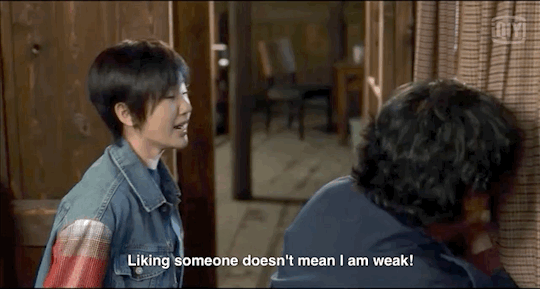
And it doesn’t. Being in love has nothing to do with weakness or strength. Being a young, and excitable, and a woman does not equate to weakness either.
I’m not saying that this show is a feminist manifesto, because it is definitely not that. Every other prominent female character suffers a pitiful fate in service of creating motivation for the men of the story. But it does spend a lot of time making sure you, the viewer, know its heroes well enough to mentally befriend them. And if this means giving the female lead complexity, I cannot possibly be mad at that.
So, this was it. This was the Lost Tomb Reboot. It brought me a ridiculous amount of joy and I will miss it a lot.
And yes, the picture spams will be 100% an excuse to rewatch at least some of it.
PS. Said spams miiiiight be gif based if I figure out a way to colour correct the damn things.
#lost tomb reboot#reunion: the sound of the providence#review of sorts#now with gifs#the gifs are bad though
26 notes
·
View notes
Text
RWBY Recap: “As Above, So Below”
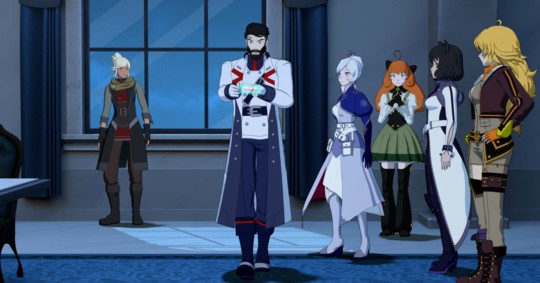
Welcome back, everyone. So. Last Saturday I was actually feeling pretty good about RWBY. Not as a whole, but for that particular episode because, as I explained to a lovely anon, not much happened. Sure, there were some semi-important bits in the form of meeting Willow and Weiss discovering the recording, but compared to everything else we’ve gotten this volume it was all around a tame fifteen minutes. Which meant there wasn’t much space for RWBY to mess things up. There simply weren’t any stakes last episode. You don’t like how the group gets past Whitley or the exact words Ironwood says to Jacques? It’s ultimately whatever in the grand scheme of things. Last episode was mostly details.
“As Above, So Below” is not that kind of episode. So much happens and I’m once again left metaphorically banging my head against the wall, not regarding the writing choices themselves per se, but rather at how they’re used and portrayed. There is so much that I want to enjoy about this episode but Rooster Teeth continually ignores aspects of a situation in order to highlight one very narrow, very biased viewpoint. The scenes throughout demand that we conveniently forget or outright ignore certain things in order to immerse ourselves in whatever emotion the writing has decided we should be feeling right now ... and I simply can’t do that. RWBY is a show based on the claim that it’s a bright sunny day, so pay no mind to the rain clouds hovering above your head. It’s the animated equivalent of a Jedi mind trick. These are not the interpretations you’re looking for.
Secrets are finally revealed, folks, and oh boy. It’s a hot mess.
But let’s start at the beginning.
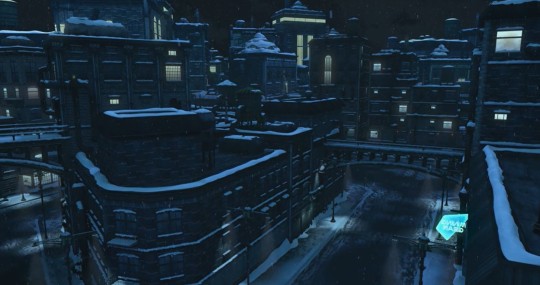
Undermining my assumption last recap that Watts had dismantled something that was regulating just a portion of Mantle’s temperature---something specific to maintaining rain over snow---we learn that all heating has been lost across the city. Which, if you know anything about temperature and the fragile human body, is really fucking bad. Here RWBY actually did a good job of introducing Weiss’ comment early in the volume about how people can freeze to death within an hour or so. We were still left with a few detail-oriented questions like how useful aura is in combating that, why Ruby was still so cold with her, why no one was showing symptoms back during the walk to the farm... but at least the setup is clear here. Civilians don’t have aura so that’s that. They’re dead if they don’t find some way to keep warm (riot fires help...) or aren’t evacuated somewhere else. It’s a big deal, though how exactly this fits into the rest of Watts’ plan and the other bits of chaos he’s accomplished is still unclear. More on that in a bit.
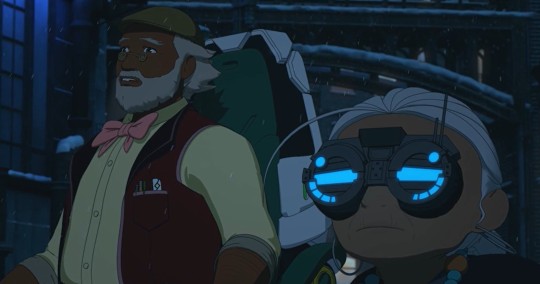
We see Pietro and Maria, but they don’t actually do anything this episode. They just stand around looking scared as people get violent and the city is covered in ominous red lights. At least the show remembers that they exist, but we don’t get to see the brilliant scientist specializing in creating weaponry and the former Grimm Reaper doing something to help. So... B grade on that one?
There’s no time skip this episode so with Mantle unraveling we segue right back to the dinner at the Schnee’s. Ironwood is still getting called out for having too much power. He pushes back that there are checks and balances in place to keep everyone, including him, from abusing that power. This is countered with a broad and not very persuasive claim that they simply haven’t worked. Ironwood comes back with a line about intentions and the nameless (?) council guy goes, “What people intend and what people do are not always the same thing!” Well no shit. If that were the case everyone’s lives would be staggeringly easier. You intend to find the madman who dismantled your army at Beacon? Boom, done. Intend to find the murderer responsible for attacking Robyn’s supporters? Congratulations, you did it. RWBY now has a habit of throwing out lines to remind us that the evil men in power---notably Ozpin and Ironwood---might intend to do good, but look! They haven’t managed it! Which... yes? Sometimes intentions fail, but that leaves the unanswered question of what these characters (and the writing) want them to do instead. No one has the luxury of changing their situation and everyone continues to ignore the fact that there are only bad options all around. I’d rather have someone with good intentions at the helm than, you know, Jacques. It also speaks volumes that as much as the council and RWBYJNR has been criticizing Ironwood lately, everyone still expects him to make the hard call himself. They don’t want that responsibility; they want a scapegoat if and when things go wrong. Just like the group was happy to scream at Ozpin and then get pissed that he left, leaving them to make the hard decisions themselves for once, everyone is screaming at Ironwood and then two minutes later turn about with, “So what should we do, General? What’s your plan? How are you going to fix this?” Though I don’t think any of it is intentional, RWBY has a lot to say about how only good and lucky leaders get to come out of their role unscathed. No matter what you do someone hates you for it and even choosing to abstain isn’t an option, as we saw clearly with Ozpin.
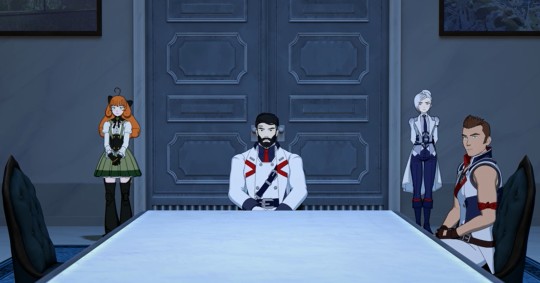
At this point the meeting is briefly interrupted by a waiter who tells Jacques about the heating issue. He responds with a, “My authorization?” before trying to cover things up, awkwardly agreeing with the conversation he just missed. Robyn announces that she’s not done with Ironwood yet though and accuses him of more failures, ending with, “yet you won’t let your own council help you?” which... honestly? Just hammers home how not useful this “Ironwood should trust everyone!” mindset is. Because is Robyn really that dense? The council is Jacques and two of his lackeys. You know, the guy who is about to be arrested for treason and as an accomplice to murder. Even though that hasn’t been revealed yet, Robyn is very well aware of what a corrupt, dangerous individual he is. Remember that she herself is not the council. She was given a “seat at the table” because Jacques wanted to use her against Ironwood. Robyn is sitting here symbolically pointing to Jacques and the two members he has wrapped around his finger going, “Why aren’t you trusting them?” like that’s in any way a sound suggestion. Sometimes the answer to, “Why are you doing Bad Things like keeping secrets?” is “Because people can be unimaginably stupid.” This is an example of that. Robyn wants to know everything and right now she’s willing to risk that information falling into an enemy’s hands to get it.
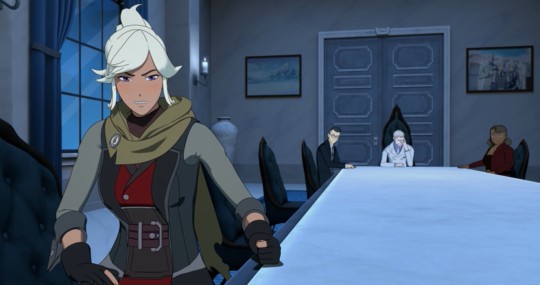
(Also, that picture in the background? Says a lot that Jacques has a picture of him, his obedient son, and his terrified wife in the room where he conducts business. No Weiss or Winter in sight.)
Ironwood, of course, tells a straight out lie with an excellent poker face. “I’m not hiding anything.” Which inspires Robyn to use her semblance. Oh no! An insanely convenient ability that would undo every conflict we’ve set up for this season! However will we avoid this? Timing, obviously. Weiss, also conveniently, barges in right when Robyn has put Ironwood on the spot. I said it as soon as Robyn’s semblance was introduced: if you give someone that level of power---something that can too easily solve all the problems you’ve set up---then you have to keep coming up with semi-contrived ways of keeping them from using it.
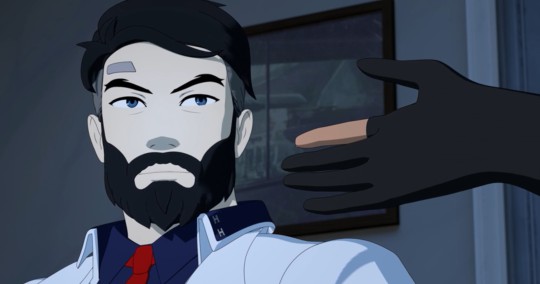
Also, does she need skin-on-skin contact for her semblance to work? I wonder if that’s why she’s got that one random finger missing on her glove.
Wiess plays the recording of Watts and Jacques, giving us the rest of their conversation. We don’t learn anything new. Watts promised Jacques a seat on the council and he in turn (supposedly) would get the satisfaction of ruining Ironwood’s life. Jacques handed over his login information, including what he gained post-election, and now Watts has access to everything he built and then some. To say that’s bad is an understatement. You might be distracted from your worry though by hearing that cake line again as well as the men’s villainous laughs. RWBY really went full cartoon for that conversation.
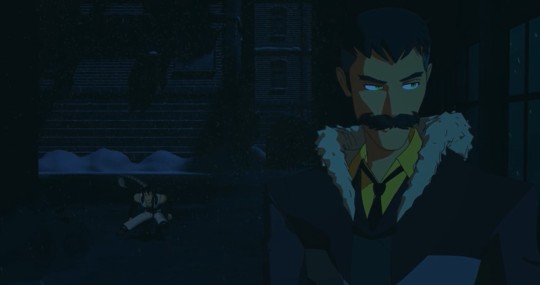
A detail I really love though? Ironwood’s rhythmic footsteps as he walks around the table. Super ominous and intimidating. Meanwhile, a hilarious detail is how awkward Jacques gets when he’s finally lost that precious control. This isn’t a confident man capable of denying the accusations against him in anything like a persuasive manner. He doesn’t have Ironwood’s poker face. Jacques is a coward who looks like a schoolboy seated in the principal’s office once caught.
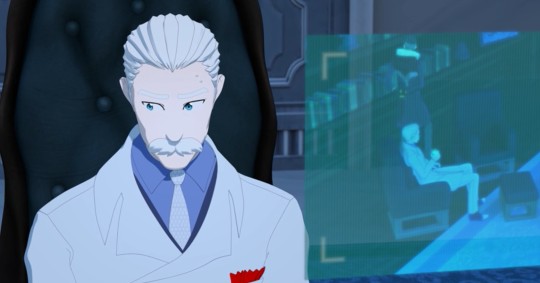
He attempts to escape only to find Weiss’ knight blocking the exit, the one we now know was the possessed armor that belonged to her grandfather. In a thoroughly satisfying moment she declares that Jacques is under arrest... and then turns around to ask Ironwood if she can actually do that. I’m on the fence about this. Normally I don’t mind a bit of humor lightening the mood, but in this case we have three things that I don’t think are improving the situation. The first is the sheer emotional impact that should be accompanying this arrest. This is Weiss’ abuser. The man we’ve known about (incidentally anyway) since Volume 1 and who has driven nearly the entirety of her character development from working to escape him pre-RWBY to coming back as a huntress. Provided that Jacques doesn’t pull a Torchwick and escape himself somehow, this is the culmination of nearly seven volumes worth of heartbreaking struggle. There are some things that I think should be allowed to shoulder their weight without undercutting it with a joke and this is 100% one of them. Just like finding out that a friend you thought had been permanently torn to pieces in front of you should generate heartfelt shock and joy, reaching the moment where you finally arrest one of the show’s biggest personal villains should be treated seriously. Let Weiss have this and put the joke later if you still want it. Weiss could be staring hollow-eyed at her father being put in handcuffs and Ruby could try to cheer her up. “So...” she says. “Can we arrest people?” Weiss blinks, coming out of her stupor, and gives a tentative smile. “Don’t know, actually. But it’s working in this case.” There. Serious moment leading to a bit of comedy-bonding. Humor is a wonderful tool, but it also lessens the other emotions of a scene if not used properly.
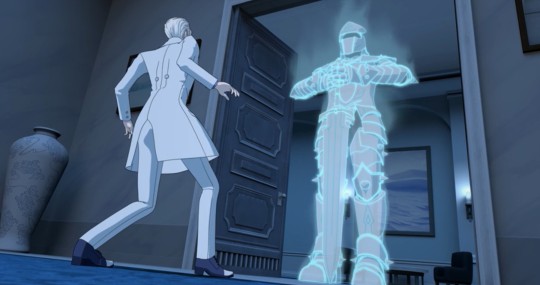
Potential issues #2 and #3 are smaller. On a personal note, hearing Weiss’ question simply reminded me, again, that RWBY has failed to establish hard rules for its world, including what a huntsmen’s job entails. A few weeks ago fans were arguing over whether Blake and Yang should feel anything in regards to killing Adam because, according to some, it’s already a part of a huntsmen’s responsibilities to arrest and if necessary kill people. Why would they flinch at something they knew they were signing up for? Others (myself included) pointed out that although we see the students sparing with one another at school, no one says anything about them taking out human and faunus criminals. RWBYJNR’s adventures---from Ruby stopping the robbery in her trailer to tracking down the White Fang---are presented as outliers. This is not the sort of stuff huntsmen are meant to get up to. They fight grimm first and foremost. Everything else is a case-by-case surprise. Note, for example, that Ironwood expects his army to keep the peace and presumably the police when things aren’t quite so dangerous. He’s not sending huntsmen out to track down everyday criminals because that’s not their job. Killing grimm is. Weiss’ comment reinforces that. Can I arrest someone? Is that within my power as a huntress? And Ironwood... doesn’t answer. Because it’s meant to be a joke, not a legitimate bit of world building.
And then the third... is just how Rooster Teeth is using humor throughout the entirety of this episode. AKA not well, which makes me less inclined to give this particular moment the benefit of the doubt. We’ll get to that in just a second though. For now I’ve written way to much on a two second scene.
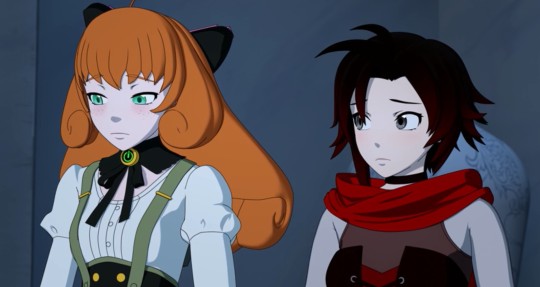
While Jacques’ plans unravel the rioting in Mantle is getting worse and worse. “Atlas killed the heat on purpose! They’ll do anything to control us!” which is very much a conclusion born of panic. It feels like every other episode Mantle is on the verge of collapse and, by extension, all of these moments feel anti-climactic. We’ve watched Mantle rioting over the embargo, and then Penny, and then the election, and now the heat... none of it feels like it has weight anymore. Rioting is just the way we’re ending most episodes now. It also (again) raises that question of what exactly Watts is trying to accomplish, and not in a “Still to be revealed!” kind of way. We do still have an element of that, but at this point there’s also just a, “Literally what was the point?” aspect too. Why is Mantle rioting most episodes? Shouldn’t that be something to build to? More importantly---as I’ve said before---WHY did they frame Penny? We see in the next scene that Jacques’ guilt likewise reveals Penny’s innocence... even though everyone important knew that two seconds after she was accused. There were no consequences attached to blaming her and, as just established, we clearly didn’t need the loss of a city defender to bring that city to the brink. Mantle has been going over the edge for a variety of reasons and the people were at that point before the group even arrived. When Penny was first framed that seemed like a brilliant setup. Now we see definitively that it led nowhere. Why did Watts bother and why did the writers? It’s another case of RWBY chucking in things they think are “cool” without bothering to follow up on them.
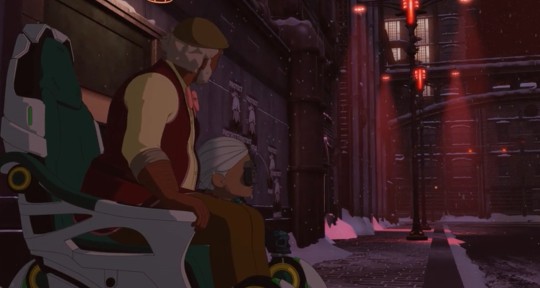
So yeah. The Penny situation is done. We didn’t even get any development out of her from it. That really is disappointing.
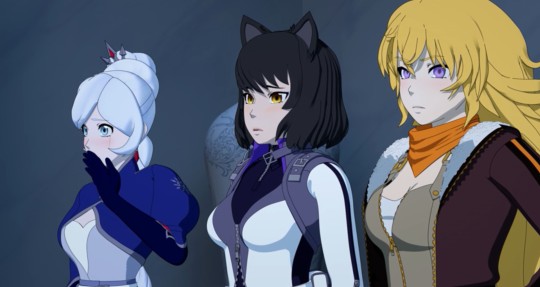
With everything Jacques did on the table the situation looks bleaker by the minute. What can Watts do with this control? “With enough time… whatever he wants.” The group finds out that the first thing he did with this power is shut off the heat and Weiss has the most dramatic reaction, which makes sense given that she’s the one who best understands the risks here. And then... then.
Oh dear god.
Ironwood realizes that Watts may eventually have access to the Amity info, if he stumbles across it or actively goes looking for things to uncover. This revelation on its own is good. That’s something Ironwood needs to try and prevent, so it would have been an excellent moment of storytelling to show us Ironwood’s moment of revelation, perhaps with a bit of dramatic music to hammer things home. Except that instead of keeping this issue between the people who know about it---Ironwood and Ruby could have exchanged knowing glances like Blake and Yang did when they first started keeping their secrets---Rooster Teeth has Ironwood talk about loud to himself about the major secret he’s keeping. He literally calls it a secret! “No. The secret is safe for now. But if he learns about Amity…” Hello?? I understand that this episode is all about things coming to light, but that moment was an absolute insult to Ironwood’s character. We just saw this man claim with a perfectly straight face that he had nothing to hide. Five minutes later he’s apparently lost so much intelligence he stands in front of four people he’s keeping secrets from, including Jacques Schnee, and starts soliloquizing about said secrets. That is the most stupid and contrived way to get caught in a lie. Oh no! I totally forgot a bunch of people were standing beside me! Now everyone has heard that I’m keeping a secret since I felt the need to state that out loud...
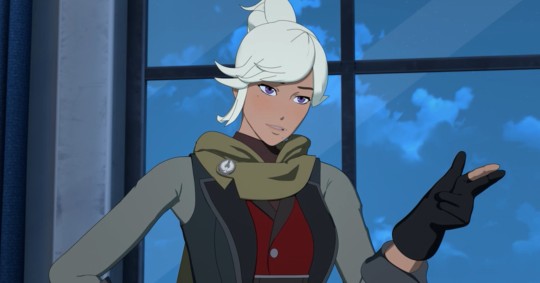
And in case anyone thought this is a case where I’m reading too much into things, Robyn literally laughs and goes, “Yep! Still here, everyone!” Reminding them that someone who is not supposed to know about this stuff is standing... right there... listening in... The writing draws attention to it.
This trumps all other former stupidity. Like the group loudly announcing their attempts to avoid getting arrested in the city covered with surveillance. This is so stupid I want to turn it into a meme. Cleanse this scene somehow.
Anyway. More rioting. More anger. Shock, surprise, that draws a ton of grimm. Take note of the fact that Ironwood’s army is almost useless against this barrage. The missiles from the airships don’t seem to take the horde out. Nor do the guns. Two other soldiers are forced to cower when some pterodactyl-type grimm flies overhead.
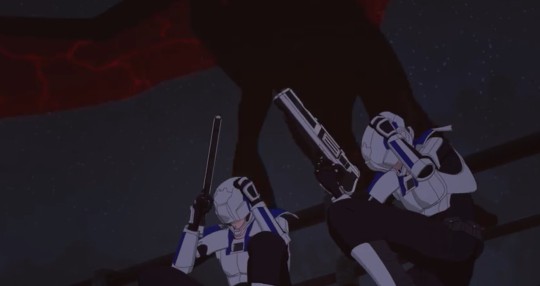
I say this not to bash the army itself (they’re doing their best while up against horrible odds), but rather to re-emphasize how not good telling the whole world about Salem is. Everyone seems to forget that, first and foremost, this is the concern that Ozpin dealt with. Even if he was 100% wrong on every other count---no one would lose hope, no one would ever betray him---it is impossible to hear about Salem and not experience negative emotions and those negative emotions draw grimm that kill everyone. Ironwood’s primary justification was that he’ll use his army to protect the people when that happens and (ignoring that his army can’t possibly be everywhere at once) we see here that it’s all but useless. His soldiers may have been able to handle the grunt grimm seen at the breach and the Battle of Beacon, but they’re helpless in the face of anything stronger, the exact sort of stuff that world-wide panic over an immortal woman would draw. Clover makes it clear when he arrives that only huntsmen stand a real chance and huntsmen are few and far between nowadays. They lost an entire school. Lionheart made sure nearly all the huntsmen in Mistral were killed. They’ve reached a point where teens are given licenses at least two years early, without full training, because they need the help that badly. Ironwood cannot protect the people if their fear grows stronger. That’s not his fault, but it also means he can’t afford to deliberately stoke that fear. Telling the world about Salem, whether she’s immortal or not, is a 100% death wish for lots and lots and lots of people.
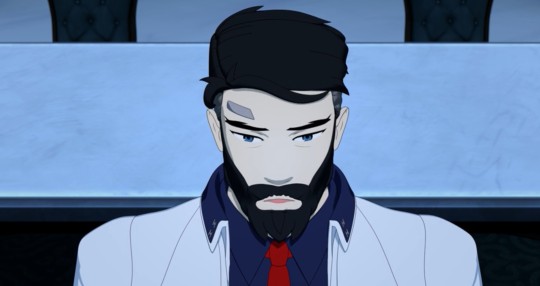
That’s why I can’t get behind an idealistic view of, “But they deserve to know.” Maybe they do, but if given the choice I’d rather keep people in the dark and let them live their lives than tell them for the sake of the moral high-ground and risk the very likely possibility that they’ll die a horrible, bloody death.
Then, finally... we come back to the group’s secrets.
As established, Robyn is calling Ironwood out on his own secret keeping because he just admitted aloud to having a secret. 100% dodged her suspicion by Weiss’ timely arrival and Jacques getting outed as a traitor, then went ahead and shot himself in the foot. Sorry. I just really can’t stress that enough. Anyway, she’s homing in like a bloodhound, backing him into another corner, and this is the animation they decide to give us.
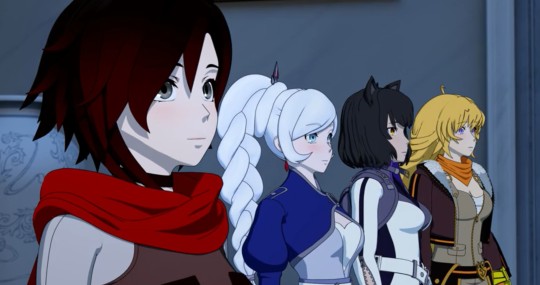
This is why I haven’t liked the group since mid-Volume 5. Because they’ve become reckless, hypocritical, often incredibly cruel people. Animation is a drawing. Someone had to decide and design this moment. Nothing is left to chance. So Rooster Teeth made a conscious decision to have Ruby almost-smiling in this moment. Looking pleased and happy at the very least. She’s still keeping her own secrets and is taking pleasure in the fact that Ironwood’s are coming to light. This is the exactly the same behavior we saw with Ozpin and (to a lesser extent) Cordovin. The satisfaction this group derives from either seeing or handing out what they perceive as another’s just desserts while they themselves are committing the same or worse sins. Ruby should not look happy here in the same way that she should not have pushed for Ironwood to sacrifice Mantle in the name of finishing a doomed project. And as we’ll see in a moment, she shouldn’t be giggling with Oscar over the shared damage they’ve caused.
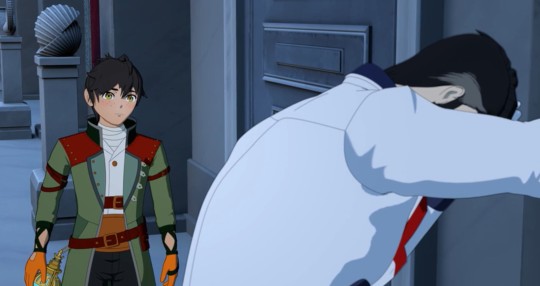
At this point everyone is ganging up on Ironwood. Yes, including Oscar. As a preface to all this, I love my farm boy. Just not how Rooster Teeth has been writing my farm boy. Because this is what I meant at the very start of this recap. Oscar and Ruby’s speeches here are only inspiring if you choose to ignore the fact that, in this moment, they’re still keeping their own secrets. I honestly thought Oscar was going to come clean when he approached Ironwood leaning against the wall. Instead he offers his advice which is, straight up, to just stop keeping secrets. Says the kid who is still keeping secrets. Oscar even goes so far as to say that “You already knew that wasn’t the right course” which is the biggest load of BS I’ve heard on this show so far. No! No one agreed that was the wrong path. You all explicitly decided that keeping secrets was the right thing to do. They’re telling him he was wrong to choose the thing they benefited from and continue to use to their advantage in this scene.“Tell the truth,” Oscar insists, still not telling the truth. “You’re not alone,” Ruby adds when she hasn’t trusted Ironwood once this season. This moment is manipulation because Oscar and Ruby both are trying to convince Ironwood to do something using false personas. Ironwood believes that he should listen to them precisely because he thinks they’ve achieved the very thing they’re demanding of him: sharing all their secrets. He thinks they’re models to look up to. When in fact Ironwood is the only one who has ever managed this demand by sharing his plan with them, completely of his own volition.
The fact that they decide to tell him a few minutes later doesn’t matter. They already got what they wanted and the damage is done. I mean that literally. By manipulating Ironwood into spilling the beans, they’ve created a situation where Ironwood revealed the Salem secret to the council and Robyn but not her immortality. Ironwood himself only learns of that afterward, back in the dining room, and you can see the utter devastation on his face.
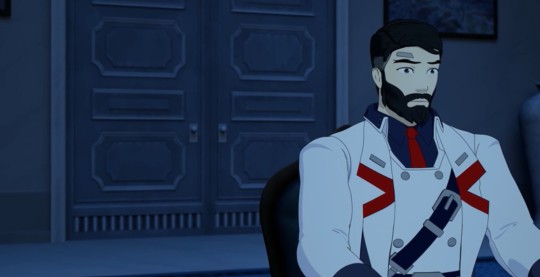
Is it still a good idea to tell two highly suspect council members and a woman who has been his semi-enemy about Salem given that she can’t be killed? Who knows. We don’t get to tackle that question because Ironwood wasn’t given a choice. It’s too late. He was pressured and manipulated into a making a huge decision without all the necessary information (which, for the record, is still not the same thing as the group deciding to help people and do the job they signed up for without knowing about Salem). Even if nothing horrible results from these three people now knowing about Salem, Oscar and Ruby have created more problems. We hear the council woman ask fearfully whether Ironwood can defeat Salem. The only thing holding them together is the hope that they can still win with their army... but they can’t. What’s Ironwood going to do with that expectation now? Will he tell them about her immortality too? Risk what they might do in response? Don’t you think this is something he should have known about weeks ago, Ruby? “You should know before you make any… sacrifices” Oscar tells Ironwood, completely ignoring the fact that he already made sacrifices. Mantle was a sacrifice. Those resources were a sacrifice. Telling the council was a sacrifice. Ironwood’s ongoing hope that he could finally end this, stretched out far longer than it had to be, was a sacrifice.
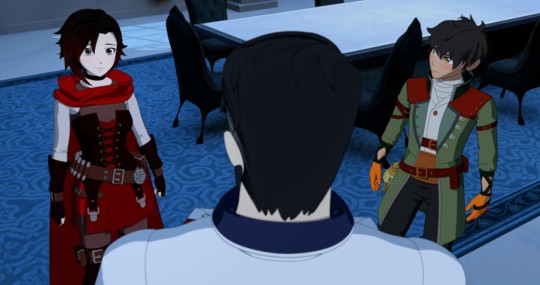
What kills me is the casual nature of it all. There was no catalyst here. Nothing new happened to convince the group that they can suddenly trust Ironwood. If they’re willing to trust him now that means they trusted him before and just didn’t tell him because... they didn’t. The defense of “He’s unstable, who knows what he might do to them and Mantle once he finds out the truth!” was a smokescreen the whole time. Because nothing changed. Ironwood said and did nothing in the last fifteen minutes to suddenly cause the revelation of, “Oh my god. We can trust him. Now we finally know we’re safe to reveal this secret.” They could have done it on day two and avoided so much strife. Like, you know, the situation in Mantle that Nora felt the need to scream at Ironwood about. Maybe if you’d told him his plan was doomed he might not have taken so many resources from the people, given that he’d have known there was no longer a justification for that. You had the power to fix the problems you blamed him for from the get-go.
Combine this with Oscar and Ruby’s horrible conversation. Sure, the rosegarden shippers are thrilled, but beyond the fact that I’m personally not shipping Ruby with a boy housing her 1,000 year old headmaster, that (once again) was not the correct emotion to apply to this moment. They both come across as horrendously callous by laughing and giggling through the decision to finally tell Ironwood. It’s not like these secrets have driven this entire volume and are about to absolutely devastate him or anything. Why would you have a serious conversation about this? Why express even an ounce of sympathy and regret for what you’ve done? Nah, better to jump around and give each other thumbs up. Act so proud that you’ve randomly decided to come clean, like you deserve praise for this. Kids, am I right, Marrow?
Seriously. This is how these two treat the situation vs. what the situation actually is.
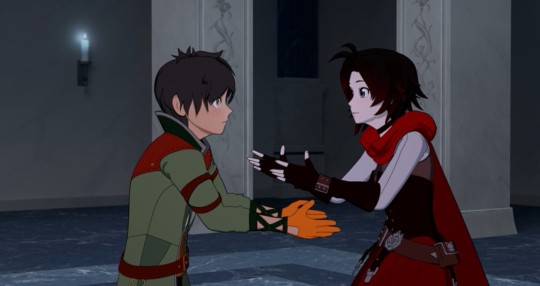

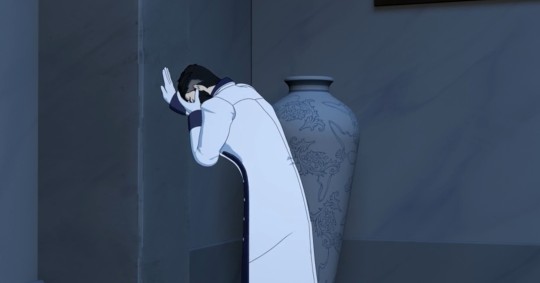
Which in a horrible way is fitting because there are zero consequences for all this. (Cue my shock...) Ironwood isn’t mad about any of this. He jokes with Oscar! “No more surprises, alright?” Given that RWBY releases weekly and thus there’s plenty of time between episodes, I feel like people forget the expectations they developed months back. The more optimistic side of the fandom (god bless you all, you’ve got more hope than me) keeps insisting that eventually the group’s new behavior will lead to repercussions, but time and time again Rooster Teeth tells us they won’t. Not for putting Argus in danger. Not for stealing an airship. Not for keeping the secrets Ozpin was crucified over a whole volume for. And that’s still going. Alongside Qrow’s talk with Ruby, Ironwood is given the space to blame Ozpin again---“Why? Why would Oz keep this from us?”---and has no desire to blame the group for doing the exact same thing. Oscar is allowed to go, “Sorry! We just didn’t trust you” but the same justification out of Ozpin’s mouth doesn’t fly, despite the fact that he had a hundred more reasons not to trust a bunch of teens. The level of hypocrisy in this episode is just staggering. We all watched Ruby tell Ozpin’s lies and went, “Oh yeah. This is going to come back to bite them” and it didn’t.
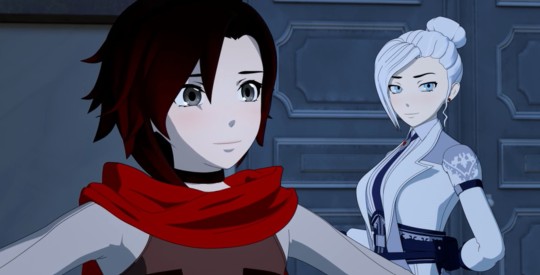
There is nothing the group can do to get in trouble, or even a reprimand for. Anything and everything is twisted to praise them:
Destroyed precious military equipment (which this episode’s attack shows that the world desperately needs) and nearly get people killed by attacking an ally? You get a free ride to Atlas.
Broke Atlas’ laws by stealing their property and then avoiding the police? You get hugs from your sister and early huntsmen licenses.
You tell the exact same lies you demonized your headmaster for? You’re so much better than he is and I’m so proud of you.
Keep secrets from Ironwood, making a horrible situation even worse? Haha no more surprises in the future please!
And yes, this also includes: Going behind everyone’s back to spill information to Robyn? No one will even find out you did that. I’ve seen a post going around with people expressing how pleased they are that Robyn didn’t rat Blake and Yang out. That’s the level of bias the fandom and the writers are working under. The group gets away with everything because they’re the protagonists. Everyone adores them unconditionally. At this point I think they could join with Salem and people would insist that it’s the smartest and most badass move they could possibly make. Fans and the writing would praise them for that too.
Ugh. Sorry for the level of salt in this recap. For the record I am glad that others are able to enjoy all of these moments. I just can’t. Oh boy I can’t.
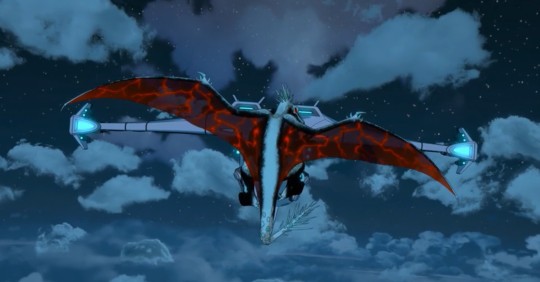
Alright. Close to wrapping up now. A series of smaller things: Oscar has another moment where he draws on Ozpin’s memories of Atlas being built. “You say that like you were there---” Ironwood says. We’ve spent a lot of time theorizing about the merge but in light of this episode... are we really expecting an explanation? RWBY hasn’t adequately explained dust vs. magic, or Qrow’s semblance, or why we should be rooting for heroes who do everything their perceived opponents do. Why would we expect them to explain something as complicated as this merge either? I think we should just expect a continually wishy-washy situation that changes based on the whims of the plot.
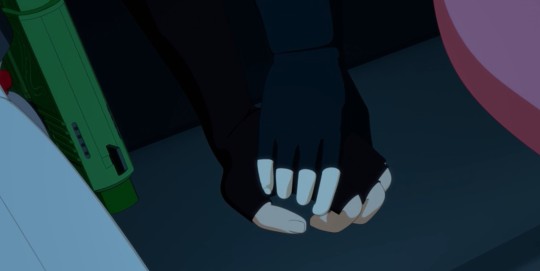
Ren and Nora have a moment on the airship that sparks another charged look between Blake and Yang. Are we ever going to tackle the huge concerns Ren had a few episodes back before they were silenced with a kiss? Does he or anyone else know that Oscar spilled the beans? For that matter, did Oscar admit that there’s still a question left in the relic? Does Ironwood actually want to lock it up now like they should have from the start? Did he explain precisely why Ozpin ran off? These answers remain lost to the void.
Jaune looks like he’s going to be sick after the airship is attacked. Nice throwback to episode one.
Whitley is devastated by his father’s arrest, truly alone now. He slinks off with Willow watching him go. Hopefully with Jacques out of the way she and Weiss (and possibly Winter) can start helping him. Show him how to connect with others in ways besides cruelty.
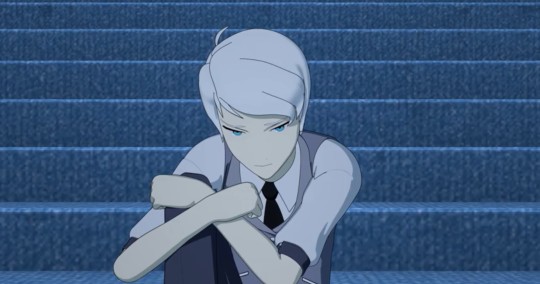
The group then jumps out of the destroyed ship... but not before Elm and Harriet tease each other a bit. In a kind way. One might almost say... a friendly way...
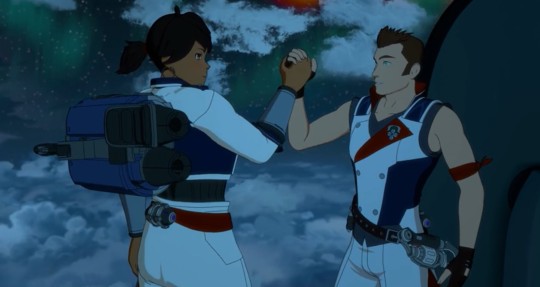
Yeah these people aren’t friends. No way. What an absurd assumption. Will the show ever come back to that assertion, or will it remain another illogical way of insisting that the group is intrinsically better than everyone else they come into contact with? I’m betting on the latter.
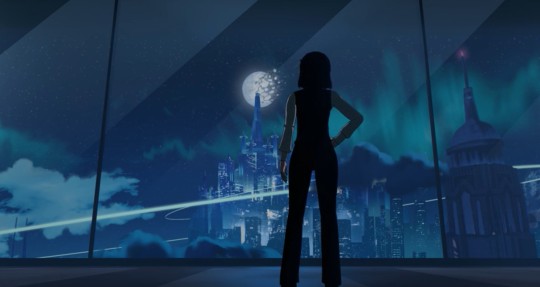
Finally, we catch glimpses of a disguised Neo infiltrating the Schnee manor. After everyone leaves she returns to Cinder who says, “Oh, you’re back early. Tell me you’ve found what we’ve been looking for” and Neo gives an affirmative gesture. To which I respond with no emotion whatsoever because this episode has scorched me from the inside out.
1/10 with the 1 given because yay arresting Jacques. Everything else I’d happily put through a paper shredded. I’m gonna go cleanse my mind with more Witcher 3 now.
Until next week! Everyone start praying...
84 notes
·
View notes
Text
7 reasons The Witcher series is a mess (or damn I need to vent)
Unpopular opinion time! For the record, I’ve read the books, played the games, hell, I’ve binged the Polish movie and series (because my love for Michal Zebrowski and Zbigniew Zamachowski is undying, sue me), and I was super hyped. Then I spent the entire series yelling at the TV, so I made a handy numbered list of the reasons why I personally consider it mediocre at best.
Because I’m fucking disappointed and I’ll never not be bitter about it. Fact.
Be warned, there are all sorts of spoilers below.
Let’s look at some of the issues that affected the show as a whole:
1) Adaptation is hard work - but you have to do it right
Adapting a story from one medium to another is difficult, you inevitably have to change things to make it suitable to the new form of expression and also, everybody wants their adaptation to be unique, to emphasize points they think are important, to reflect on the current times, you name it. But changes in an adaptation should make sense and lend themselves to the storytelling.
Many changes in the series were arbitrary, nonsensical and contributed absolutely nothing. One such example is the Battle of Sodden Hill, a terribly executed “siege” with not enough extras to fill a classroom instead of a battle of 100 000 people. Writing out Redania, Aedirn and the Brotherhood of Sorcerers from the conflict doesn’t seem to have a point to it, while the delayed arrival of the armies of Temeria and Kaedwen is both unexplained, unlikely and underwhelming, not to mention that it completely undermines the Nilfgaardian threat as a whole. This, of course, is just the tip of the iceberg of all the things that are wrong with Sodden Hill in the series.
Or take Foltest and his affair with Adda. It is perfectly clear in the books that after seven years of wizards, witchers and all manner of frauds coming and going while Foltest is obsessed with breaking the curse instead of killing his daughter, even the very last blind and deaf peasant knows about his shenanigans. It’s only logical, too. The story is relayed to Geralt in no uncertain terms at the very beginning. Now in the show the whole episode is too short to set up a murder mystery that requires Geralt’s incredible detective skills (uhuh) to unravel. What is worse is that you cannot make a big reveal of something that your audience actually has previous knowledge about. So why even bother to have Foltest deny it and have Geralt beat it out of Ostrit?
Which brings us to point two:
2) We all know which way to Temeria, don’t we?
Even if you have popular source material, you cannot expect everyone to know it. An adaptation has to consider people who are just getting their first introduction to the sandbox. When your lore is as rich as that of the Witcher, you need time and careful effort to set up your world. The show made a total shit job of this one. As in the above example, sometimes the show ignores that we, as an audience, know things.
Another example is Vilgefortz. We know him, his plans, abilities and allegiances, we have very specific expectations of his character. Besides completely failing these expectations (and doing a very unconvincing early reveal of his true colors), the show goes as far as taking Vilgefortz’s iconic sentence (You mistake stars reflected in a pond for the night sky.) and putting it in Fringilla’s mouth. Like did they actually think we wouldn’t notice? Or not be pissed?
At other times the show expects us to fill in its glaring blanks exactly by knowing our lore and characters. One obvious, overarching example of this is the issue of the separate timelines, that sometimes left even fans a little confused. Also, fun fact: one of my friends (who has no idea about anything in the Witcher’s world) for instance needed some time to realize Pavetta wasn’t, in fact, a grown-up Ciri, and he remains to this day very confused about Blaviken.
Basically, we are on a swing here, which is actually made even worse by another thing: bad pacing.
3) Hold your Roach for a moment
The first season wants to cram too much into its limited time and it has a severe negative impact on worldbuilding and character development. By bringing in all three timelines from the beginning, the show has to juggle time allotted to each.
To be frank, Ciri’s timeline at this point consists of a lot of running and screaming, which in itself hardly merits all the time we spend with her. It could have been utilized in part to provide us with a view of the war from ‘below’, to show that beyond the high politics and heroic battles there are burned villages, dead peasants, people who lost everything, cripples, deserters, ruined fields, and so on. Instead, we get one refugee camp of neat tents, actual beds, food and complaints about Calanthe (though not of dead husbands, lost homes or winter). Though I guess it should come as no surprise that the shock value of paint being made from a woman’s reproductory organs (that never happened in the books) is more important than actual large scale human suffering.
Now giving Yennefer an extended back story is great. But by that level of extension once again time is being consumed that is taking other opportunities away. Opportunities like giving Geralt himself a bit more background, clarifying points for fresh faces in the audience, giving characters more time for meaningful interaction. Because there is not enough time to let the story breathe and progress naturally, episodes are often rushed, choppy, and shallow.
4) Reverse worldbuilding, aka welcome to nowhere
Another serious issue with worldbuilding is what I suspect to be a deliberate departure from the game visuals and aesthetic. One of the things I adore most about the games is that it built heavily on Eastern European history and folk tradition. Nothing compares to the feeling when you ride into a village and you feel right at home because things are inherently familiar, or you go out into the woods and hear the exact bird song you are used to.
Netflix is very careful not to even offer a whiff of this particular identity to its show, but it doesn’t seem to have a clear artistic vision beyond that. Thus while landscapes are nice enough, other settings such as cities, taverns, ballrooms and the like are horribly bland in that “this is how we imagine the middle ages in Hollywood” way and look exactly what they are: sets. While one is not likely to quickly forget the red rooftops of Novigrad or the wild beauty of the Kaer Morhen pass from the games, there is nothing memorable about the locations presented in the series. (Even more bewildering is the depiction of the elite boarding school of Aretuza as a creepy dungeon with elf skulls everywhere. I cannot even begin to address this one unless it is all in caps.)
Point being that the show lacks an actual visual identity that would distinguish it from any other dime a dozen medieval fantasy.
5) My kingdom for a decent wardrobe
Sadly enough, the bland and flavorless visuals have a terrible effect on something else: clothes and armor. While some costumes are well done, there are way too many examples of the opposite. One very obviously is Nilfgaardian armor, which looks like fossilized trash bags with sad dick helmets. The fact that armor in the show is treated as the equivalent of cardboard is doing no one any favors. Please do your homework next time. Please?
Another inexplicable departure from the books and games is the appearance of the nobility, and most jarringly, sorceresses. That dress Yennefer picks out the first time? It’s literally the drabbest, ugliest thing I’ve ever seen, and the others are not much better. When it comes to period-accurate choices, the range is just so wide: we are talking cambric, velvet, silk, cloth of gold and silver. We are talking luxurious furs, embroidery, colorful feathers, bright dyes, coats of arms and jewelry. Brooches, necklaces, bracelets, rings, hat badges, belt buckles, hairpins, you name it. People wore their wealth. Making them look like sad orphans will not make them look any more medieval.
Peasant clothes also had their decorations, though to a lesser degree than nobles, obviously. But I guess it’s too much to hope that those would get any attention when queens are dressed like they lost a bet.
6) I see your people and I raise you mine
Including people of color in the casting choices caused a lot of heated debate amongst the fans, but at least it means that the show cares about minority representation, right? Right?
The world of the Witcher has its own minorities, and what we have seen of them so far is so incredibly pathetic that I haven’t the words. For one thing, they look so terrible that elves in the Polish series actually look better, and that was so not a high bar to exceed. To make matters worse, they again seem to lack any sort of distinguishing visual identity (except for the Dryads. I’m also willing to make an exception for Chireadan, as he actually looks right and he’s a settled elf.)
Sadly, unlike the games, the series also fails to establish even the beginnings of a compelling narrative for its minorities, which definitely needs to be in place by the time Thanedd happens at the very latest. What is more, we seem to be given something called the Great Cleansing, which is plenty obscure but comes across as a Night of Broken Glass sort of thing (though that could be just me). While still salvageable at this point, this shift in narrative is cause for some concern, and so far doesn’t make much sense.
7) Your villains are not my villains
Unlike the books and games, the Witcher series sadly doesn’t seem to excel at presenting opposing sides without the need to vilify one (which again, makes me worried about what they are going to do to the Scoia’tael later).
Nilfgaard is now an Empire of Evil (TM) that lives for killing and religious fanaticism, Fringilla is a psychopath, and Cahir... Well, Cahir is a thousand shades of wrong all on his own. Stregobor and Istredd are now assholes of a whole different caliber, and even poor Eyck of Denesle gets to enjoy his five minutes of fame as a madman frothing at the mouth instead of a paragon of knightly virtue.
This is going so well.

#the witcher#the witcher netflix#the witcher spoilers#the witcher netflix spoilers#review#crit#i am so disappointed in you#I'm legit afraid of s2
8 notes
·
View notes
Text
VLD7x08 – “The Last Stand Part 2”
7x08 – “The Last Stand Part 2”
This episode is so frustrating for so many reasons. Killing Adam is offensive because Joaquim Dos Santos and Lauren Montgomery explicitly used Adam and their announcement that he was gay and had been romantically involved with Shiro in order to bait people into watching this season, and then they kill him, having since said that they did so because they needed to kill a notable character to make the Galra feel threatening; in other words, they built Adam up as gay (because that is all that he is in this show) and then killed him; they specifically killed him because he was gay.
This episode also continues to act like Sam is right about everything and Sanda is wrong about everything. This time, the show doesn’t even pretend to care about writing realistically. Sanda is an admiral. Sam’s and Iverson’s insubordination would not be tolerated in an actual military. It makes this show seem like its creative team have a huge disdain and disrespect for the military. At the very least, it makes the creative team seem completely ignorant of how solid the command structure is in the military. Sanda ends up just letting Sam and Iverson do whatever they want, and that would not happen.
Sam continues to benefit from Perfect Pidge plot armor, and his obnoxious constantly being right about everything makes me really not like his character.
The Veronica “death” and reveal to still be alive a few minutes later has little-to-no emotional impact. It mostly just gives me narrative whiplash.
This episode really needs some help.
The episode starts with Sendak leading the invasion. The last time Sendak seemed interesting to me was 1x11 “Crystal Venom,” and that was because of how much his disembodied voice messed with Shiro psychologically. He has never felt more threatening than he did in the scenes in that episode, scenes in which he did nothing but have some taunting dialog while being unconscious.
The music continues to be really nice.
Sendak orders the Galra fleet to fire upon various cities on Earth. Only the Galaxy Garrison has any defense, with its forcefield blocking blasts. Sanda orders a military response, surface-to-air blasters and a wave of fighters with a second wave ordered to prep for launch. Sam – I am so tired of him – objects to her “us[ing] the standard defenses.” If everything is as dire as Sam has told everyone, then they need to use literally everything they have, including “standard defenses.” Sam wants to use the MFE pilots. Yeah, that’s fine and good, but there are only four of them, right? James Griffin, Rizavi, Kinkade, and Leifsdottir. The four of them are nowhere near enough to handle a planetary invasion. Sam tries to juxtapose the four MFE pilots with the Paladins of Voltron, and that is annoying on multiple levels. One, the Paladins are flying battleships, not fighters, and the technology of the Lions are way more advanced than the MFE fighters. Two, his comparing the two groups of characters seems like it’s part of how this invasion and occupation story was the attempt to prove a spinoff viable, but this just reminds me of how this is setting the show’s main characters aside in order to introduce a bunch of new characters, none of whom are as interesting as the actual main characters of the show.
Iverson is hesitant to follow Sanda’s orders. This is a failure of military discipline and a demonstration of the EPs’ and writers’ ignorance about how the military functions. Iverson says to Sanda, “I know you have wartime authorization, but maybe we should listen to—” Forget “wartime authorization,” how about the fact that Admiral Sanda outranks Commander Iverson. If Sanda wasn’t busy trying to initiate a defense of the planet, she’d have every right to have Iverson charged with insubordination. I really don’t like that this continues pushing the idea that Sam is right and Sanda is wrong. I don’t necessarily reject the idea that the MFEs and the new fighters should be involved, but the idea that four of them are exponentially better than a broader force is absurd.
Oh look, it’s Adam. Joaquim Dos Santos said that they just had to kill Adam here because “we knew seeing a familiar face bravely make the sacrifice along with the squadron he led (and countless others) would help get across the gravity of this invasion” (quoted from JDS’s post season seven apology letter that he posted on his social media). The only way Adam is a “familiar face” is because of how much he was used to promote the season. He has not been seen since his brief scene in 7x01 “A Little Adventure.” Despite what JDS said in his letter, if you’re going by just the episodes themselves and not any of the promotional work, then Adam is NOT a “familiar face.” It feels like this part of JDS’s attempt to justify killing Adam is built on a lie.
Sam says to Sanda, “You just doomed those men and women.” This is more of Sam benefiting from this show’s use of Perfect Pidge. The premise the show is using in Sam’s argument is absolutely absurd, but the show makes Sam right because he’s Sam. It just amazes me that this show thinks that they’re demonstrating how much better Sam is than everyone, but because the show is basing Sam’s argument on something unrealistic – that the four MFE fighters are superior to the entirety of the rest of the military – it has the opposite effect for me. The show wants the audience to think Sam is being shown to be smarter and wiser than everyone else, but I end up disliking Sam more and more. I am really hesitant to ever use the term Mary Sue, but Sam is really close to being one.
The Galra destroy the ground-to-air blasters. The fighters’ missiles do nothing to the Galra ships. Some of what this battle does is try to present the idea that the Galra are so superior to Earth technologically, but that’s so obvious that it shouldn’t need to be said. We know from interviews that JDS and LM thought killing Adam was necessary to prove that the Galra were a threat. Having the protagonist side of the battle have zero success, like here in having the missiles impact the Galra ship but do no damage, does not make the Galra look formidable, it makes them look unrealistic. I do think Earth would be thoroughly outclassed by the Galra in a battle, but demonstrating the futility of Earth’s attempt at defense does not require the Galra to be undamageable.
There’s either an animation, direction, or editing error during this battle. Track this sequence of shots: ONE, the Galra shoot a blast at Adam and the other fighters, TWO, the first-generation fighters that they’re using dodge the blast, THREE, Adam comments that their weapons had no effect on the Galra, FOUR, the Galra shoot multiple smaller blasters from the side of their ship, FIVE, second-generation fighters dodge the Galra attack and one of them is blown up.
Given that the whole manufactured contention between Sam and Sanda right now is that Sanda is using the first-generation fighters instead of the MFEs and the second-generation fighters, to have the animation show second-generation fighters (which aren’t even supposed to be in the air) being shot at and one destroyed totally undermines Sam’s argument. Let me add some visuals.
Here is a shot of the first-generation fighters from 7x07 “The Invasion Part 1.”

Here’s a shot of the first-generation fighters at this moment here in 7x08 “The Invasion Part 2” where they’re about to dodge Galra blasts (shot TWO in my list above).

Here is a shot of the second-generation fighters from 7x07 “The Invasion Part 1.”

And here’s a shot of the animation/direction/editing error from 7x08 “The Invasion Part 2” of second-generation fighters being shot at during Adam’s attack mission. This is shot FIVE referenced above.
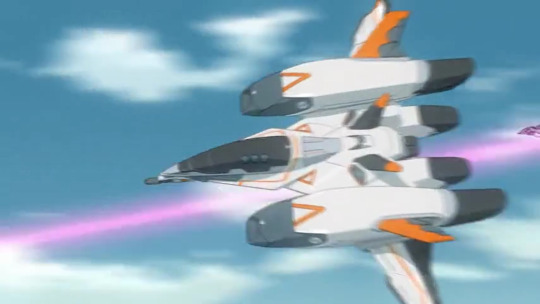
In addition to killing Adam to supposedly demonstrate how threatening the Galra are, this sequence is supposed to be about proving Sam right. It’s a fundamental element to the story of this sequence. I understand that sometimes weird animation errors happen. I’m far more forgiving of something like accidentally coloring the bayard pink in 7x03 “The Way Forward,” for example. But this animation is directly tied to the show’s own argument for Sam and against Sanda. This error makes it seem like the creative team were so Sam-is-right that they ran on autopilot during the production of this sequence. It also suggests a flaw in the design work for the two generations of fightercraft that the animators could apparently so easily mistake the two designs.
The battle shifts to the command room and the main display in the room shows most of the pilots sent in the first wave are gone. Back to the air, the last few Earth fighters are blown up.
Adam is the last fighter. The last we get to see of him is him screaming as he is blown up.
If I did not know who Adam was through all the promotion of the season that was reliant upon their having shown 7x01 “A Little Adventure” and Lauren Montgomery having tweeted about Adam being Shiro’s “significant other” and all the interviews that JDS and LM did about the revelation that Shiro was gay and Adam had been his boyfriend, if I had not had Adam’s significance inflated far more outside the show than it was in the show, then Adam’s death here would not have meant anything. If JDS and LM had not purposefully used the promise of queer representation in the show, had not used the single, short scene of Shiro and Adam’s breakup as promotional bait, then I would not have been attached to Adam. I don’t think that I would have recognized him in this episode as having been the guy who broke up with Shiro seven episodes ago.
JDS thought killing Adam would show us the stakes of the battle. Adam, whose entire presence in the show until now was one scene in which he broke up with Shiro, was a character who only had one single dimension: Shiro’s boyfriend. In other words, Adam was nothing more than gay. If, as JDS has said, killing Adam was about showing the stakes – an idea that a story has to kill characters that the audience have become attached to in order to show how much a threat the plot is – then the only reason the audience was attached to Adam was because he was gay and Shiro’s flashback boyfriend. Adam had zero other connections in the story, zero other connections to any characters. Yes, I’m fully accusing JDS and LM of killing Adam explicitly because he was gay. They can say that their intention wasn’t to use the bury-your-gays trope all they want to. Whether either of them have the self-awareness to realize this or not, whether they ultimately care or not, their decision to kill Adam is based on him being gay.
And they were surprised the audience would be upset about this. At least, they pretended they were surprised. It really says something that I’m even debating with myself whether JDS and LM were genuinely surprised that people were upset that they introduced a gay character specifically to kill him, or whether they callously did it and faked surprised to try to deflect blame for their having done it. I don’t know which is worse: that they were so socially inept that they didn’t anticipate the audience being offended or that they just didn’t care to begin with and baited people with the promotion that Adam was gay in order to increase the number of viewers for season seven.
I could probably rant about this all day.
Sendak broadcasts that he’s come for the Voltron Lions. Shouldn’t he be able to scan Earth and tell that they’re not there? Sanda replies, telling Sendak that they do not have the Lions, nor do they know where they are.
Finally, hidden in the middle of this scene’s dialog, the show finally informs us of some of the structure of the Galaxy Garrison. Sam says, “Tell all Garrison bases to call back fighters.” So, there is more than just one Garrison location. Though the Galaxy Garrison has always had some military element to it, it has been presented as an organization that conducted space exploration missions. Now, the Galaxy Garrison seems to be some kind of unified, worldwide military. I don’t know if this is the show having failed to properly define the parameters of the organization or if it’s a retcon. All Garrison bases have been attacked and are flying defense missions.
The one base Sanda and Sam are at is the only one that has forcefields for defense. It kind of makes the Garrison’s focus on developing fightercraft, since it seems they did so to the detriment of any other systems development, seem pointless. It makes me feel like the struggle of the previous episode is invalidated. I know the show would counter that the whole point is that last episode gave us four MFE pilots and the second-generation of fighters. Last episode’s position within the narrative makes it need to be about the broader totality of preparation for attack by the Galra, not just introducing four characters and their four fighter jets.
Sam tells Iverson to launch the MFEs and power up a fusion cannon. (They have a fusion cannon? This is literally the first mention of it.) Sanda threatens to court martial if any commands are given against her orders. This feels like the show is expressing a fundamental disdain for the military. Sam, despite having a supposed rank, does not at all behave like he’s progressed through a military program. Iverson too is now being written to disregard all military protocol. It is not in any way realistic for them, if this is actually supposed to be a military organization, to disregard the command of an Admiral like this. Every time Sam is pushed by the narrative to be right and Sanda to be wrong, it feels like the show is attacking the entire concept of the military. Either that, or those who wrote and produced these episodes are vastly ignorant of what the military is like.
Sam and Iverson pretty much throw the command structure in the trash. The four MFEs launch in their second-generation fighters. (I still can’t get over the animation error earlier). It’s still absurd that four fighters would ever be enough. The Galra fire on the particle barrier, which repels the attack easily.
James says, “Okay team, we’ve trained for this. We know their maneuvers and have the firepower to knock them out.” This doesn’t make any sense. How do they know Galra maneuvers since this is the first time they’ve fought them? Were there supposed to be files about Galra battle tactics in the bunch of files Sam had on his device? Wouldn’t all of the Garrison fighter pilots have trained to “know their maneuvers” then? Is the show really trying to say that only these four MFE pilots were properly trained? This is absurd. And how can James say they have “the firepower to knock them out,” when Sanda said that they hadn’t properly tested the second-generation fighters? I assume that these fighters have specific weapons systems that the first-generation did not? We only ever saw the first-generation launch one single salvo of missiles at the Galra ships, even though the first-generation fighters have a massive cannon on the underside of their nose, a cannon that looks identical to the one under the nose of the second-generation fighters. The MFEs and their fighters are feeling more and more contrived.
The fusion cannon at the Garrison base has come online, and Sam orders it to fire. Sanda just stands there. This is bafflingly badly written. This is more of the writers having already arrived at where they want the story to go with the characters rather than writing the story to develop to that point. And I continue to think that either the creatives on this show are offensively disdainful of the military, or they’re just totally ignorant. Sam has effectively successfully executed a mutiny, and I just don’t see how everyone under Sanda’s command would be so willing to go along with this.
Not that this show probably bothered to actually craft a command structure for the Galaxy Garrison, but since we’ve had both Commander and Admiral ranks used, let’s compare it to the United States Navy. Sanda is an Admiral, whereas Sam and Iverson have both been called Commander, though I question whether Sam is a ranked Commander or if he was just the Mission Commander in an astronaut sense and not in a military sense. If it is indeed that he was just a Mission Commander, then that makes his actions against Sanda even more egregious. In the US Navy, the rank of Admiral is five ranks above that of Commander. What Sam and Iverson are doing in acting against Sanda is so wrong.
The fusion cannon destroys one Galra ship. Sendak orders his fleet to attack vulnerable targets rather than this one base. The MFE pilots in their second-generation fighters didn’t really do much.
Sam says that the “rest of the globe […] need[s] to evacuate to safe zones immediately.” There are safe zones? Sanda says, “We should go after them.” She is the clear commanding officer, except for the Sam-Iverson mutiny, having her speak like this makes it sound like she’s trying to convince an officer who outranks her of a course of action. She’s an admiral, she should not be having to convince anyone here of anything. Sam got exactly what he wanted, the MFEs were put into use. And now that he has what he wanted, he no longer wants it.
The Galra are tearing up Earth. Sendak’s subordinate tells him that there’s no sign of Voltron. Since Voltron has participated in battles far bigger than this, the idea that Sendak would think Voltron was hiding here somewhere is absurd. His subordinate asks, “Should we continue the occupation, sir?” The Galra haven’t started an occupation yet. This is still the invasion. This is simple writing to get correct and the fact that this show can’t even write something this simple correctly is a sign of a seriously malfunctioning writing process.
At the GG base, Veronica says, “Commander, we are no longer receiving responses on any channels. What are your orders?” The camera focuses on Sanda, like Veronica was addressing her, but if she was, why would Veronica have addressed Sanda as Commander instead of Admiral? The show has this be a moment that’s supposed to show how incompetent Sanda is, how she’s supposed to be obviously a bad leader, and Sam steps forward to give the heroic, commander speech. It just all seems so wrong to me.
Sam effectively taking command away from Sanda makes me think of Keith taking Black Paladin away from Shiro. In both cases, the show does not properly write any sort of transition that makes sense. It’s nothing but executive decree. It’s what the EPs want to happen, so it happens. They don’t really care that it makes no sense or is very poorly developed. Sanda says, “When this is all said and done, I’m going to have you stripped of your rank and thrown in the brig for defying my orders.” Why are they even still here? I cannot imagine an Admiral actually tolerating two Commanders undermining her authority like this. They should have already been arrested.
Sanda asks, “We don’t have the Lions. Why is Sendak still invading.” Sam says, “You don’t understand the Galra.” The implication is that Sam does. I can’t stand how much arrogance that Sam is written to have, and I know that the EPs and writers don’t even realize that they wrote Sam to be so extremely arrogant.
There’s a small meeting. Food supplies are limited and there aren’t the necessary supplies to finish building the Atlas. Veronica points out there’s an abandoned supply location not too far away. There’s apparently an underground tunnel system from World War III. There was a WWIII and the show is only just now in the seventh season mentioning this? I know we haven’t been on Earth for most of this show, so maybe that excuses what feels like really late world-building. This really does make this feel like the start of a totally different show.
Veronica says the Galra are using “what looks like random patrol patterns.” If it’s random, then it’s not a pattern. How did this get written? I mean, maybe, in a first draft I could see this being written, but it should have been fixed in a script revision.
The MFE pilots are going on this supply grab mission. Why are the four supposed best pilots in the world doing anything other than being near their fighters in case they’re needed? This is absolutely absurd. Really, they’re going because they’re the main characters now, not because it makes any operational sense for them to be going. This show seems to have no sense of what division of labor is, which is baffling since in order to get an animated show made, you have to use division of labor. Veronica is going with them, and I can understand her being part of this mission.
Veronica introduces herself to the MFEs, saying, “I’m an analyst and your handler.” James replies, “We don’t need a handler.” What does this show mean by the word “handler?” Is Veronica supposed to be in command of this mission? If so, then it’s more insubordination for James to reject her authority. It’s like this show seems to think that the military would work better if every lower ranked officer defied their superior officers.
Veronica asks James if he knows how to get to the depot, he says he doesn’t, that he’ll just use a guidance system. Veronica says that the guidance system uses a network that these tunnels block. So, James and the MFEs were being sent on a mission without any kind of mission briefing? This show has no clue whatsoever how anything in any organization works does it? I guess the dysfunctional ways organizations in this show are presented should be seen as a representation of how dysfunctional this show’s production organization was.
How is Kinkade kneeling on top of the vehicle they’re using and not being thrown off it? They get to the depot where both the supplies and the train are located. They load the train and start to repair it. As time passes, James spots two Galra sentries walking down the tunnel. He, Leifsdottir, and Kinkade fire on them, but their weapons have no effect. Veronica has a suitcase sized, Gatling gun style weapon. She says she’ll hold them off. It takes a lot of shots, but she’s able to eventually bring down the two sentries only for more to come walking down the tunnel. The MFEs board the train, Leifsdottir helping Rizavi, James and Kinkade continuing to try to use their rifles. Veronica tells them to go, but James says they’re not going to leave her. There’s a huge explosion, the tunnel collapses, though the train begins its journey.
We’re supposed to be sad, thinking Veronica is dead. Maybe I would feel more about her supposed death if she had an established character. That’s a huge part of the problem with these episodes. The show wants the emotion of these events, but the characters haven’t been built enough to produce the desired emotional impact. Rizavi asks if anyone knows how to get back. Again, it’s absurd that these four were going on this mission but had apparently almost zero preparation for the mission. How to get back is not a question that anyone would need to ask if this had been written properly. Leifsdottir memorized the path on the way in, so they get back.
Veronica’s “death,” especially knowing that it’s a narrative fakeout, feels like a disrespectful manipulation of the audience. Sam says, “We have a chance now” that they have the supplies. James rants, “A chance for what? We just bought ourselves time. What is that going to do for us?” Uh, yeah, buying time was the mission. Why are these characters written this ignorantly? Sam says, “Voltron will come.” He also wants to use the bought time to finish working on the Atlas.
Sendak orders the Galra to destroy Earth’s communication network. I thought it was already not working, but okay. It seems weird that the Galra have left it functioning until now. Sendak says if Voltron knows things are bad on Earth, they’ll be cautious, but if they don’t hear anything from Earth, they’ll come with “haste.” Whatever.
There’s a montage of time passing. Work on the Atlas. The Galra are building weird partial domes over areas. Sanda asks Sam if the Atlas will be able to defend the Earth, Sam says, “It’s just one ship, and an untested one at that.” I remember a bit earlier in this episode when Sanda objected to the use of the second-generation fighters because they were untested, but Sam didn’t care about that then. It’s so inconsistent for him to care about ships being untested now.
I remember the first time I watched this episode, I was really confused about how much time had passed. I know the show used a montage, and montages imply time passing, but this episode doesn’t say how much time passed during that montage. Sam is called to the hangar. There, he sees Veronica has returned. She has a bunch of other humans with her. She says she was saved by and has been working with “an underground resistance network.” The montage is not enough to produce a sense of time passing that Veronica’s return feels like some hopeful development. There is only three minutes and 49 seconds between the tunnel collapsing and Veronica being shown to be alive. She hasn’t been “dead” for enough screen time yet for her return to feel triumphant. Since her return is in the same episode she died, it makes her death even more blatantly manipulative than if she had returned in a later episode.
Veronica says this resistance group’s intel “led [her] to [her] family.” It would help to know where this Galaxy Garrison base is. I thought it was in the southwest of the US, but if that’s where they were, then how was Veronica able to get her family from Cuba? Yeah, Veronica is Lance’s sister, but the show hasn’t bothered to state that explicitly until right now. I am baffled why. Knowing she was Lance’s sister while going through all the threat of this episode would have made the tension of that threat and the emotion of her fakeout “death” actually have more impact. By keeping her relationship with Lance unstated until now, the episode deprived itself of the necessary connection to the main characters that this episode really needed.
Veronica reports that the Galra have been putting humans into work camps and using them to build Galra installations around the planet. This isn’t really a report of anything new since this was part of the montage.
Sam declares they need to get “one last message out to Voltron.” They suddenly have a big rocket that they’re launching into space. The launch animation made me unintentionally laugh because the booster rockets separate from the main rocket, which they would do once they had finished burning their fuel boosting the main rocket, but the problem is that the boosters after separation while they’re falling away from the main rocket, those booster rockets were still producing visible thrust exhaust, so there’s no reason they would have separated yet. Sometimes like this, even the animation looks like no one bothered to do even basic research.
Sendak orders the rocket destroyed, and the Galra seemingly blow it up, until somehow a bunch of smaller satellites or something are flying all over the place. Sam says, “He fell for it.” It’s so confusing. This show does this a lot. Something is depicted visually with no explanation, and it makes you go, what just happened, and then a bit after it happened a character explains it. It’s a storytelling style that I just find disorienting. Apparently, the missile, despite being blown up, distributed “micro transmitters, millions of them, spreading throughout the sector.” Really, “throughout the sector?” They’re only shown being around Earth.
Unsurprisingly, they’re broadcasting the message Sam sent and Voltron received at the start of last episode.
Cut to who knows how much time later. Sam is giving a big speech like he’s the leader of everyone, Sanda, despite significantly outranking Sam stands quiet, obediently behind her subordinate. Sam’s speech is supposed to be inspirational, but because I don’t buy into Sam as a leader because of the absurdity of how he’s assumed this position, it just frustrates me. He says they have resources left only for one last stand.
Then cut to back millions of light-years outside the Milky Way, Voltron there, and the third time Keith has piloted Voltron forward.
Like I said about rewatching last episode, this one also does not hold up well under my increased scrutiny of this rewatch. I’m still furious about the show killing Adam and JDS’s and LM’s pathetic attempts to defend that decision. This rewatch, I was more baffled by the, at best, ignorant way military command was written.
Like most of this show, this episode really needs help.
#voltron legendary defender#voltron#vld#voltron criticism#vld criticism#voltron critical#vld critical#vld season 7#vld 7x08#commentary
18 notes
·
View notes
Text
Nildungsroman
by Dan H
Saturday, 27 September 2008
Dan finally identifies something that has been bugging him.~
I've always had a problem with Modern Fantasy. Not in the sense of "published within the last five years" (although there is also that) but in the sense of "set in the real world, only with magic and shit, which most people don't know about". Possibly that's Urban Fantasy.
This whole thing struck me while I was reading Cassandra Cla(i)re's City of Bones, which funnily enough seems to have a lot of traits in common with a certain other modern fantasy series that the author may or may not have heard of, and which I may or may not have said a few things about in the past, so these comments are slightly biased towards those two august tales, but I'll also be talking about other elements of the Geek Canon, including Buffy, Tolkein and Star Wars.
As ever, contains spoilers.
The Hero's Journey: Ur Doin It Rong
For what it's worth, I'm not actually a big fan of Joseph Campbell. I think the observation that lots of different myths have lots of things in common rates somewhere between "dog bites man" and "Bishop of Rome Espouses Nicene Creed" on the duh-o-meter. On the other hand, the Hero With A Thousand Faces One Of Which Is Luke Skywalker does nicely identify a basic structure which can, at the very least, make sure that a mythically-slanted story doesn't suck donkey balls.
Very broadly, the Hero's Journey has three stages: the departure, the initiation, and the return. The hero starts out as Joe Ordinary (or possibly as Joe Destiny), then goes off into the Crazy World of Magic Shit, then comes back a better and more complete man. Along the way he has to get eaten by a whale and meet a goddess, but that's basically the deal (any inaccuracies can be attributed to my not actually having read The Hero With A Thousand Faces and thus getting most of my information from Wikipedia).
Star Wars, as you probably already know, was based very, very, very (very, very, very) closely on the classic Campbellian journey (right down to including the trash compactor scene pretty much entirely to tick the "hero goes underground and bad shit happens" box). Early season Buffy actually holds fairly closely to the model as well, both in terms of its overall arc (at least in seasons 1-5) and the structure of individual episodes. An episode of Buffy usually opens with our heroine facing a Typical Teenage Problem, then getting drawn into a supernatural event which allowed her, at the end, to resolve her Real Life problem as well as lay the smackdown on some vampires. As I've argued before on Ferretbrain, I think Buffy lost its way around the point it stopped bringing everything back to the real world.
And that, in a roundabout way, is what I think is wrong with Modern Fantasy. If you blinked you might have missed it, so I'll say it again more explicitly. A lot of Modern Fantasy seems to be at least loosely based on the Hero's Journey, and while it does the departure and the initiation really well, it seems to write the whole "return" bit off as a waste of time. Modern heroes leave their home and family, descend into the underworld, and bloody well stay there.
Now I admit, part of this is going to be structure. In a TV series about fighting vampires (for example), you'll always get to the point where you can't view "going out to fight some vampires" as anything but routine, and you can only escalate so far before you have to play the "real life is the greatest battle" card or the "fighting the very essence evil itself" card (neither of which worked). On the other hand, part of it seems to be an issue with people actually missing the point of the Hero's Journey. I'm going to talk about both these phenomena, because I like to hear myself talk.
Sunnydalization: Myth Invades Reality
If, like me, you wasted your entire undergraduacy watching Buffy videos, and can quote pretty much the entire seven series end to end, including the "grr-arg" bits with the mutant enemy logo, you'll probably remember the bit in Prophecy Girl where Willow finds two dead bodies in the student lounge in Sunnydale High and, despite having seen at least a corpse a week for the past series, gets totally freaked out. When challenged about it, she says:
"I'm not okay. I knew those guys. I go to that room every day. And when I walked in there, it... it wasn't our world anymore. They made it theirs.
And at that point, Buffy changed subtly but irrevocably. Prior to that scene, Sunnydale was the real world, and the Hellmouth was the place where the monsters were. Every week, Buffy would battle the legions of hell, and every week she would come out and go to class and we would see exactly what she was fighting to protect. We'd see Jonathan and Cordelia and Harmony and the rest, all going on with their totally normal lives, totally unaware that little Miss Summers had been saving their collective assi.
After that moment, though, it all changed. Things got bigger and scarier, and the Demons didn't go back into their box. Buffy may have defeated the Master at the end of Season 1, but she failed to defeat the Hellmouth, and as the seasons progressed the line between the "reality" of Sunnydale and the Underworld of the Hellmouth became more and more blurred. In season three we are told that the mayor "built this town for demons to feed on" and by the end of season seven the two are so inextricably linked that the final closing of the Hellmouth actually destroys the town.
As I said above, I ultimately think this is an inevitable effect in a long running series. The first time a vampire attacks somebody on school grounds it's scary. The twelfth you just start to wonder why the school is still open. The Sunnydale body count became something of a running joke ("if we train hard, keep focus, and don't have so many mysterious deaths, Sunnydale is gonna rule") but while it was funny it also began to undermine the point of the show. What started out as a nice little town threatened by a supernatural enemy became itself a seat of magical corruption. By the end of series seven there is literally nobody normal left in Sunnydale, they've all evacuated because of the effects of the Hellmouth (even the more sympathetic demons get out of town).
What this means is that, by the end of the series, Buffy has literally nothing left worth fighting for, except possibly Joss Whedon's ropey feminist doctrine. The later series of Buffy fall flat because, as Sunnydale itself becomes a place of evil, the Slayer loses all contact with the real world.
Mugglism: The Family Romance
Ultimately, though, I can forgive Buffy for its structural flaws. What I have more trouble with is the peculiar tendency in a lot of Modern/Urban Fantasy to treat the Fantasy World as just flat-out better than reality.
The chronic offender in this case is, of course, the Wizarding World of the Harry Potter series. Harry is rescued from the dull, dreary (and psychotically abusive) Dursleys, the "biggest load of Muggles" Hagrid has ever seen. He is then taken away into the wonderful Wizarding world where everything is fabulous and magical. He then discovers that he is a figure of the utmost importance in said world, and people either treat him with awe or loathing, both of which he finds equally affirming, while the infallibly wise guardian of his new world assures him that he really is all that and a bag of chips. Meanwhile the author informs us in interviews that everything in the Wizarding world is indeed superior to everything in the real world.
Oh, and just to forestall the inevitable "but the Wizarding world is really dangerous" apologia, there are two things to say about that. Firstly, until Rowling writes a scene that actually reminds me of the Holocaust, instead of just vaguely alluding to people making Nazi salutes, real life has Rowling licked when it comes to being dark, man. Secondly, horrors of actual, non-school-based wars aside, "like the real world but nastier" is yet another way of saying "like the real world but better". I'm going to hark right back to my third ever Ferretbrain article here and say that one of the things that really impressed me about Pan's Labyrinth was the fact that the really scary thing in it was not the Faun, or the Labyrinth, or the dude with the eyes in his hands, but the brutal mass-murdering fascist.
Anyway, where was I. Oh yes. The "fantasy is better than reality" style of Urban Fantasy usually winds up being a version of the (Freudian, and therefore almost certainly no longer reputable) idea of the Family Romance. The belief, common in young children, that their parents aren't their real parents, and they're actually something different and special. Of course most of us then grow up and realise that our parents are pretty okay people, and that being a Magical Princess probably wouldn't be that great, and actually there's some pretty radical stuff in the real world which we could be getting on with (like writing for webzines or playing World of Warcraft).
A mythical journey in which the Hero leaves the real world and then never comes back is always going to seem, to me (and therefore to anybody who matters), to be fundamentally juvenile.
Pan's Labyrinth would have been completely meaningless if Ofelia did not ultimately end up confronting Vidal (albeit hopelessly), and the Lord of the Rings loses a lot of its impact if the Hobbits don't go back to the shire. Harry Potter may save the Wizarding World, but muggles like me have no reason to care about that. Stories like the Potter series work absolutely fine, as long as you're still labouring under the illusions that you're a beautiful unique snowflake, and the only people that matter are you and the few others you're willing to accept as equally special. The moment you - not to put too fine a point on it - grow the fuck up, and realise that everybody else (yes even the teachers at your school, yes even your parents, yes even the kids who are mean to you) are real people with their own lives and ideals, you have to let go of the belief that your secret world is the most important one.
I've not yet finished City of Bones, much less the whole "Mortal Instruments" series, but it's shaping up to go the same way as potter: a long story about somebody totally failing to grow up.
In Conclusion: Why Americans Damned Well Should Be Afraid of Dragons
Roleplayers in the audience will probably know that White Wolf Game Studio used to publish, as part of their risibly-entitled World of Darkness line a game called Changeling the Dreaming. It was a game about, like, the loss of innocence and the death of dreams, man. Players took on the role of Changelings, fairy spirits in human bodies, who were slowly losing their beautiful-unique-snowflakeness under the crushing "Banality" of the modern world.
As games went, it was alright, it fetishised childhood in a slightly iffy way, but otherwise was decent Guns and Wizards Urban Fantasy fare. What bugged me about it, though, was the way it essentially divided everything in the world into "Banal" (soul destroying and imagination crushing) and "Glamorous" (drawing on the power of the Dreaming, the wellspring of human imagination). In particular, what bugged me about it was that it assumed that "imagination" was associated purely with the trappings of medieval fantasy. An artist who paints grim cityscapes and urban decay is Banal, an artist who paints forests full of dancing elves is Glamorous.
Who Wants to be a Millionaire is Banal wish-fulfillment tapping into people's desire to get something for nothing. The hundred or so fairy stories about farmer's sons who get fantastically rich because of a stroke of good fortune are totally inspiring and bring out the best in humanity.
In her article Why are Americans Afraid of Dragons? Ursula le Guin observes (perhaps correctly) that the Fantasy genre is looked down upon in America, and that this is perhaps indicative of a society too obsessed with industry, productivity and profit, and distrustful of the imagination. Fiction in general, and fantasy in particular, encourages the reader to stop thinking about how they can best make a million bucks before they're forty and start thinking about any one of the million other things they could be doing. As Le Guin puts it:
"Fantasy is true, of course. It isn't factual, but it is true. Children know that. Adults know it too, and that is precisely why many of them are afraid of fantasy. They know that its truth challenges, even threatens, all that is false, all that is phony, unnecessary, and trivial... They are afraid of dragons, because they are afraid of freedom."
Of course the important thing to remember about this particular essay is that Le Guin is using "dragons" and "fantasy" as a shorthand for "fiction in general", and you could the mistrust of Fantasy in the twentieth century with the mistrust of the novel in the nineteenth. A lot of fantasy readers (and, by extension, some fantasy writers) go further. Like Changeling they come to view "elves and dragons and shit" as being synonymous with imagination, and to view imagination as the only virtue required in humanity, instead of as part of a healthy, well rounded personality.
Sensible proponents of Fantasy argue that it is perfectly okay to like dragons and wizards, and that the presence of fantasy elements does not make a story frivolous. Less sensible proponents of fantasy seem to want to argue that it is perfectly okay to like nothing except dragons and wizards, and that fantasy elements make a story more meaningful by their mere inclusion. This is particularly common in fandom and geekdom, where people are massively more inclined to focus on the details of a particular setting (elves, vampires, wizards) than on the actual contents of the narrative (destruction of rural England, coming-of-age in small town America, why suicide is totally heroic).
Obviously, I don't want a return to the nineteenth century, I don't want a world where nobody reads fiction, or where it isn't considered perfectly okay to pick up the odd bit of Laurel K Hamilton if you feel like something light and pulpy, but I am deeply concerned about a Fantasy genre that is coming to view fantasy as an end in itself. That's fine if you're aspiring to nothing more than light holiday reading, but a lot of fantasy (even, or perhaps I should say especially children's fantasy) takes itself very seriously, and it's ludicrous to try to deal with "real" issues in something that's totally divorced from the real world. You can't show us the reality of war in a world where everybody acts like an overgrown five-year-old and people only die when the author is trying to make a point.
Fantasy is not factual, and because it is not factual it must remain true, and the truth is that the real world matters, and that real people are amazing, and a Hero who doesn't return is no hero at all.
Themes:
J.K. Rowling, Books, TV & Movies, Sci-fi / Fantasy, Whedonverse
~
bookmark this with - facebook - delicious - digg - stumbleupon - reddit
~Comments (
go to latest
)
Arthur B
at 15:31 on 2008-09-27I'm reminded a little, in fact, of Terry Gilliam's
Tideland
, which kind-of repudiates the fantasy-as-an-end-in-itself stance he took in some of his earlier films: in that one you have plenty of people who use fantasy as a means of escaping from the world around them, with the result that their lives are completely stagnant and horrible, and you've got the protagonist who uses fantasy to endure the world around her whilst still progressing through it, so she comes out the other end more-or-less unscathed and with a potential adoptive mum to boot.
You've glossed over an aspect of the Hero's Journey a little, which is that when the Hero returns to the everyday world he isn't just a fuller and more complete man, he actually enriches the everyday world by the fact that he's gone on this journey in the first place.
Lord of the Rings
is an exceptionally good example of this; not only are the Hobbits better people for having gone to fight Sauron, but when they get back they solve the Shire's problems and then (for the most part) become its primary movers and shakers for the next generation. Arguably, part of the problem with the way Buffy developed was that whilst Buffy's own real life problems were often solved by her adventures, she didn't so much enrich the community by her adventures so much as prolong the death throes of the status quo: things gradually get worse, and worse, and worse in Sunnydale until it all goes to shit. Harry Potter's magical studies not only have no beneficial effects for his community in the mundane world, he's actually legally prevented from letting that happen.
I think the problem with Hero's Journey type narratives in fantasy set in the modern day is that "it's the modern day, but with vampires" seems far too close to the real world, if you see what I mean. Back in the day it was sufficient for the hero to walk a long long long way away and people could accept that "oh, OK, way over there is the land of magic and adventure". The problem with the likes of Buffy and Potter is that the land of magic and adventure is
right on their doorstep
, and this actually makes the return to the real world slightly problematic; because the vampires and werewolves and death eaters are in such close proximity (physically and in terms of always getting in each other's face), you'd expect the hero to be concerned about them all the time. The reason
Narnia
does the Hero's Journey so well is precisely because Narnia is a mythic otherworld which it's non-trivial to get to, and I would argue that that's a requirement for any mythic otherworld in a Hero's Journey-based story: if you can get to the Hellmouth by walking down the street then that's not so much a Hero's Journey as a Hero's Morning Jog.
I suspect the answer is to use a different myth for modern-day fantasy.
Supernatural
seems to get a lot of mileage (no pun intended) out of the old Lone Ranger/Fugitive "Eternal Wanderer" story (which has the advantage that it's a lot easier to adapt to television, because you can spin it out for as long as you damn well like, whereas the Hero's Journey pretty much demands an end point).
permalink
-
go to top
Andy G
at 20:52 on 2008-10-05Great article! That really put the finger on something that had been bugging me, except actually I hadn't realised it had been bugging me until I read the article. I was just wondering how you think Star Wars would fit into the pattern of the Hero's return, as you'd given that as an example of one closely written to the pattern, but it doesn't seem as clear-cut an example as the LotR or others where the magical world/magical powers are left behind?
Possibly a stupid question as you have clearly read a lot of stuff ABOUT fantasy (where on earth do you find it? I mean I do like to read fantasy, but I can barely ever find anything interesting written about it - except on Ferretbrain, of course) but have you read On Fairy Stories by Tolkien? It covers a lot of the themes from above, and it's one of my favourite essays with some really well-made points.
permalink
-
go to top
Arthur B
at 21:15 on 2008-10-05As far as I can tell, the supposed precise mapping of
Star Wars
to the Hero's Journey is a bit ropey, and came about mainly because John Campbell was all "Hey,
Star Wars
fits the Hero's Journey perfectly" and George Lucas said "Oh... really? I mean, yes. Yes it does."
So working out where all the various bits and pieces fit in is sometimes tricky, but I think the Hero's Return is very much there, although it's pretty much described in a single scene - it's the bit at the end where they're all getting their medals and all the rebel forces cheer them. Having ventured into the depths of the Death Star's chasm and faced the dark lord, Luke emerges victorious and the community (said community being the rebellion) is enriched for it. That's all you really need for the Hero's Return - tenuous, I know, but so's the entire Hero's Journey idea to begin with.
(The end of Return of the Jedi is interesting in this light, actually - the community is having a big party, but Luke isn't really part of it - he's off at the edge, burning his father's body and communing with ghosts, his experiences finally alienating him from his community because he's endured so many things that have no parallel in the common experience of the war - hundreds of people can claim they were involved in the attack on Death Star II, for example, but only Luke actually saw Darth Vader's true face.)
permalink
-
go to top
Dan H
at 16:29 on 2008-10-06
Possibly a stupid question as you have clearly read a lot of stuff ABOUT fantasy (where on earth do you find it? I mean I do like to read fantasy, but I can barely ever find anything interesting written about it - except on Ferretbrain, of course) but have you read On Fairy Stories by Tolkien? It covers a lot of the themes from above, and it's one of my favourite essays with some really well-made points.
I've not read it actually (I'm far less well read than I pretend to be, I just shout my opinions loudly and hope people assume I've done some research).
As for Star Wars, the "real world" if you want to call it that in the SW saga is (IMO) the Rebellion, the big deal is that while Luke goes off and learns from Jedi Masters and confronts Darth Vader, it's the regular guys in the guns-and-bombs shooting war that he comes back to. Our Esteemed Editor also points out that Luke's return to Han and Leia is a quite literal return to family at the end of the series.
permalink
-
go to top
Sister Magpie
at 20:38 on 2008-10-30Great article! I've been catching up and had just read your review where you asked why someone would have to add fantasy to New York City to find a sense of wonder--quoting that paragraph that's a beautiful image strangely undermined by the addition of werewolves, fairies, vampires and mermaids. (Central Park, Chinatown, the Hudson River are all far more interesting.)
I've always liked "our world, but with magic" in terms of books starting in our world rather than a totally different secondary world, but I totally agree with this--because as you say, setting something in our world and adding magic doesn't have to mean that our world is the world that sucks or can't hold it's own. A sense of home is always present in LOTR and that makes the Shire stand up as just as wonderful as any magical place.
It reminds me of the book Hatchet that I had to read a couple years ago for a thing I was doing on YA books. I have only ever read that book, but there are several in the series. It's not fantasy, it's about a boy who survives a plane crash and must survive alone in the Canadian wilderness. But in the end he's rescued and there's other books, some of which follow a "what if?" scenario where he never leaves the woods. What struck me about the synopses of the later books was that the main character pretty much wound up going off to live in the forest. He didn't like civilization any more and preferred his solitary life.
The idea seemed to be that the author enjoyed the more "real" life experience of fighting for your survival, hunting your own food etc. But I thought it made the whole series a failure by not realizing that the point of a Vision Quest is to find out how you can help your community. Deciding to be a hermit--a fine choice in other contexts--is here just selfish and avoiding the responsibilities of being an adult in the community.
It's just important to make the distinction between this really being a flaw in Urban fantasy and it being just something urban fantasists can use it for.
permalink
-
go to top
Dan H
at 15:25 on 2008-11-17Hiya, sorry it took me so long to reply (this just in, doing NaNo is
hard
). Thought I'd clarify one particular point:
It's just important to make the distinction between this really being a flaw in Urban fantasy and it being just something urban fantasists can use it for.
Oh absolutely. By "a flaw in Urban Fantasy" I basically meant it in the specific, subjective sense (as in "this is something I consider to be a flaw in the works of urban fantasy which I have personally read") not a fundamental weakness of the genre.
I find it particularly infuriating since so much Urban Fantasy is either targeted at children or "young adults" and if there's one thing that young adults *don't* need to be told, it's that being an adult is for losers.
permalink
-
go to top
Sonia Mitchell
at 01:52 on 2009-06-25Once again I know this is old, but I hadn't read any Campbell when you wrote this. I'm rehashing now I've read enough of
Hero With a Thousand Faces
to comment. Not all of it, I have to add (psychology texts bore me) but a fair amount (I'm also cribbing the exact terms from
here
because it's been a few months since I touched the book).
And while I agree with the points you make, Dan, I don't think HWATF backs them up. It's not a check-list of ingredients for a story, but a variety of factors of which some (not all) can be found in a given hero's journey. Refusing to return
is
a valid stage of the journey, even if it makes for an unsatisfying narrative. I agree that it marks Harry out as an immature hero, just as I think it does Achilles and the Sandman and the Pevensies (who never intended to return home in TLTW&TW). For most of us there does come that point where we stop thinking Dorothy's mad for wanting to go back to Kansas (we grow the fuck up, as you so rightly say), but nevertheless according to Campbell heroes who don't return are still heroes.
Suicide
can
be 'totally heroic' in the classical model Campbell's following, which isn't using heroes as role models. Working in the chivalric model, which I think maybe you are, naturally it isn't. And Harry Potter seems to strongly invite one to take the chivalric viewpoint, right up to telling us how 'gallant' Harry is for protecting a(n extremely competent) woman with an unforgivable curse. If nothing else, the cosmetic details (suits of armour, portraits of damsels, Arthurian treasures and constant references to Merlin) are knightly not classical, and invite one to take a certain perspective (there might be an article in this, actually...).
As far as I can tell, the supposed precise mapping of Star Wars to the Hero's Journey is a bit ropey, and came about mainly because John Campbell was all "Hey, Star Wars fits the Hero's Journey perfectly" and George Lucas said "Oh... really? I mean, yes. Yes it does."
Which I'd say is the right way to do things - treating. HWATF as a tool for analysis rather than an instruction manual on how to write fiction. I think consciously ticking off the elements of the hero's journey would make for a rather boring (not to mention contradictory) story, since the natural temptation would be to take them far too literally. I'll take tenuous any day :-)
permalink
-
go to top
http://ruderetum.blogspot.com/
at 16:20 on 2009-09-10Great article and it immediately reminded me of Guy Gavriel Kay's Fionavar trapesty, which is a bit narnian in its basic plot, has some slight elements of urban fantasy and I thin generally is a surprisingly awesome take on what seems on the surfce to be an awfully cliched fantasy world. Commenting on heroic suicides, I think this one has one brilliantly haunting example and a few others might qualify as well.
But really made me recollec this is the development of Dave, who is kind of an average guy compared to the rest of the cast and doesn't get any cool pwers or even the girl or anything. But in a very awesome ending, without any sense of needless fanfare, you know that he'll return back to the real world and things will be okay.
I won't explain more because I'd hate to spoil it for any one and I guess it would be a bit tedious.
permalink
-
go to top
In order to post comments, you need to
log in to Ferretbrain
or
authenticate with OpenID
. Don't have an account? See the
About Us
page for more details.
Show / Hide Comments -- More in September 2008
#Ferretbrain#Harry Potter#J.K. Rowling#Buffy the Vampire Slayer#Ursula K. Le Guin#The Mortal Instruments#Cassandra Clare
4 notes
·
View notes
Text
The May Days: Stories of Courage and Resistance: Snapshots from the History of May Day
May Day is one of the days on which anarchists celebrate self-determination and self-realization. People have lit bonfires to mark the end of winter for thousands of years; it wasn’t until industrialization forcibly disconnected people from the land base that nourished them that May Day came to be observed as a labor holiday. At base, May Day isn’t about labor: it’s about abundance. It’s about excess, pleasure, freedom—the burgeoning source of life itself. As a millennia-old holy day honoring the return of spring, May Day directs our thoughts to nature—a wild and beautiful chaos that flows through us and nourishes us, which we can enjoy but never control. Our joyous acts of rebellion do not point to a world in which workers are paid a little better for their labor, but to the possibility that we could sweep away all the forms of oppression that stand between us and the tremendous potential of our lives.
Here follow a few recent exciting moments in the centuries-old legacy of May Day. All the best in your own efforts today: as the folk singer croons, “To fight for something is to make it your own.”

May Day 2012 in Seattle.
Before May Day: 1871, 1877, 1884
Before May Day became the international day to celebrate labor struggles, workers and other rebels observed March 18, the anniversary of the beginning of the Paris Commune in 1871.
For example, on March 18, 1877, the young Peter Kropotkin joined Pindy, Stepniak, and anarchists from all around Switzerland for a march in Bern. Kropotkin is largely remembered as a peaceable advocate of science and mutual aid, but he and his friends brought flagpoles, brass knuckles, and other weapons to defend themselves. After a lengthy street confrontation, they managed to rescue their red flag from police who tried to seize it, and proceeded to a 2000-strong meeting at which they recited speeches, sang revolutionary songs, and read out telegrams of encouragement from France and Spain.
Meeting in Chicago on October 7, 1884, the Federation of Organized Trades and Labor Unions resolved to demand that the workday be limited to eight hours by May Day 1886. The leadership of this organization, which later became the American Federation of Labor (AFL), secretly issued a statement advising members not to become involved in the movement around this demand, but the rank and file embraced it in large numbers.
1886
The anarchist organizers Albert and Lucy Parsons led 80,000 people down Chicago’s Michigan Avenue in the first modern May Day Parade, chanting, “Eight-hour day with no cut in pay!” Over the next few days, 350,000 workers around the US went on strike at 1200 factories, including 70,000 in Chicago, 45,000 in New York, and 32,000 in Cincinnati.
Four days later, the police attacked a labor rally in Chicago, someone responded by throwing a bomb, and the rest is history.
Albert Parsons and four other anarchists lost their lives in the ensuing show trial, which was so widely regarded as rigged and unjust that in 1893 the governor overturned the convictions and criticized the court proceedings. Lucy Parsons, later a co-founder of the Industrial Workers of the World, dedicated herself to a life of revolutionary organizing.

1891
Determined to avenge the Haymarket martyrs and build a revolutionary movement capable of abolishing capitalism and the state, the seasoned anarchist organizer Errico Malatesta secretly returned to Italy in order to prepare fierce demonstrations for May Day.
On the afternoon of May 1, 1891, thousands of workers gathered in the plaza of Santa Croce in Rome to hear a series of speakers. A march of thousands more soon arrived, including members of the anarchist federation with red-trimmed banners. As the police chief noted, “The appearance of the Federazione Anarchica stimulated immediate excitement in the crowd.”
The anarchist Amilcare Cipriani, who had been condemned to death and then exiled to New Caledonia as punishment for acting as Chief of Staff during the defense of the Paris Commune, rose to speak. Noting the forest of bayonets with which hundreds of soldiers and mounted cavalry had surrounded the plaza, Cipriani pleaded for calm, arguing that it was not the proper time to confront the authorities. Yet an unscheduled speaker, the anarchist Galileo Palla who had lived in exile in Argentina with Malatesta, leapt onto the rostrum and exhorted to the crowd to rise in revolt, concluding, “Long live the revolution!”
The ensuing riots spread throughout the city and lasted well into the night.
1894
Massive rioting swept Cleveland, Ohio on May Day 1894 in protest against unemployment stemming from the economic crisis of the previous year. The Pullman Strike began a few days later, on May 11, culminating with countrywide disruptions and the murders of many workers by police and other mercenaries.
In response, President Grover Cleveland announced that Labor Day in September would become a national holiday, attempting to coopt workers’ struggles without affirming the anniversary of the Haymarket incident. Samuel Gompers, a founder of the AFL and a virulent opponent of immigration, anarchism, socialism, and, later, the Industrial Workers of the World, supported the federal government in crushing the Pullman Strike and backed Grover Cleveland’s effort to undermine the momentum of May Day. Make no mistake: the official leadership of legalized labor organizations has largely aimed to tame and hobble them from the very beginning.
1909
Two labor rallies were announced for May Day 1909 in Buenos Aires. One was organized by the socialist General Union of Workers (UGT); the other, by the anarchist Argentine Regional Workers’ Federation (FORA).
As anarchist historian Osvaldo Bayer recounts, “After noon, the Plaza Lorea began to fill with folk not habitués of the city: lots of mustaches, berets, neckerchiefs, patched trousers, lots of fair hair, lots of freckled faces, lots of Italians, lots of ‘Russians’ (as the Jewish immigrant was called in those days) and quite a few Catalans. Along came the anarchists with their red flags: ‘Death to the bourgeois! War on the bourgeoisie!’ were the first cries heard.”
The rowdiest crew seemed to be the anarchists from the association “Luz al Soldado” (“enlighten the soldier”). According to the day’s police report, they wrecked trams, liberated horses from city cabs, and smashed bakeries that refused to shutter their storefronts in observance of the workers’ holiday.
Unexpectedly, police chief Colonel Ramón Falcón drew up in his vehicle and gave the order to attack. Police cracked heads, shot demonstrators, and trampled them on horseback, killing as many as 11 workers and seriously injuring dozens more.
Socialists joined the anarchists in calling for an open-ended general strike demanding Falcón’s resignation. The Colonel responded with arrests and raids and shut down the anarchist press. On May 4, 33 years to the day after the Haymarket incident, a crowd of up to 80,000 gathered to accompany their martyrs’ remains to the cemetery. Falcón’s police showed up again to beat and shoot at the bereaved.
One of the anarchists impacted by the May Day massacre was a Ukrainian-born teenager, Simon Radowitzky. Six months later, Radowitzky used a homemade bomb to blow up Falcón’s carriage, killing the Colonel and his secretary Juan Lartigau. When finally caught and beaten by police, he shouted, “Viva el anarquismo!” Radowitzky became one of the most prominent political prisoners in Argentinian history.

A collection of posters illustrating the diverse ideologies competing to define the meaning of May Day.
1919
Riots broke out again in Cleveland, Ohio when reactionaries and police attacked a May Day parade of union members, anarchists, and socialists protesting the imprisonment of Eugene Debs, a labor organizer who had cut his teeth in the Pullman Strike decades earlier.
1937
Between May 3 and 8, in what came to be known as the May Days, clashes erupted in Barcelona between anarchists and other grassroots participants in the Spanish revolution, on one side, and on the other, police, communist party members serving Stalin, and other members of the Republican government. This presaged the defeat of the Spanish revolution at the hands of Franco, betrayed by authoritarians within its ranks.
“The thing for which the Communists were working was not to postpone the Spanish revolution till a more suitable time, but to make sure that it never happened. This became more and more obvious as time went on, as power was twisted more and more out of working-class hands, and as more and more revolutionaries of every shade were flung into jail. Every move was made in the name of military necessity, because this pretext was, so to speak, ready-made, but the effect was to drive the workers back from an advantageous position and into a position in which, when the war was over, they would find it impossible to resist the reintroduction of capitalism… There is very little doubt that arms were deliberately withheld lest too many of them should get into the hands of the Anarchists, who would afterwards use them for a revolutionary purpose.” -George Orwell, Homage to Catalonia
1945
As a teenager, the Spanish anarchist Antonio García Barón joined the Durruti Column to defeat fascism and advance the anarchist revolution during the Spanish Civil War. Thanks to the indifference of capitalist nations, Nazi support for Franco’s forces, and the communists’ betrayals of other anti-fascists, the revolution in Spain was defeated by 1939, but Barón himself never gave up. He made his way to the battle of Dunkirk, where he gave a hungry British soldier a much-needed lunch break by grabbing his gun and shooting down two Nazi warplanes, much to the soldier’s surprise.
Not long after, Barón was captured and sent to the Nazi death camp at Mauthausen. Even surrounded by mass executions and starvation, Barón carried his anarchist ideals with him. During a visit by Himmler himself, Barón managed to confront the SS leader. Spain had taken away Barón’s nationality when he entered the concentration camp; he never attempted to get it back. In Mauthausen, Barón was marked with a blue triangle and the letter “S”—the mark identifying prisoners who were deemed stateless.
The gas chamber executions at Mauthausen continued until just before Adolf Hitler committed suicide on May 1, 1945. On May 5, the Allied Forces liberated the Mauthausen concentration camp. They were welcomed with a banner that read, “The Spanish antifascists salute the liberating forces.” With the defeat of fascism and the liberation of the concentration camps, Antonio García Barón set out to live his life outside the reach of the state, capitalism, and most importantly the church. He settled down in the Bolivian jungle where, despite jaguar attacks and multiple assassination attempts, he lived on to be the last survivor of the Durruti Column.
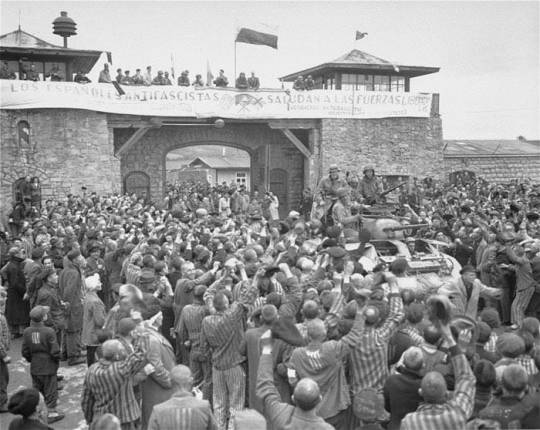
Spanish antifascist prisoners celebrate their liberation from the Nazi death camp at Mauthausen with a banner on May 5, 1945.
1950
Black workers in South Africa had participated in May Day demonstrations since 1928, when their march dwarfed the whites-only demonstration organized by the racist Labor Party. In 1950, the Communist Party of South Africa called for a May Day strike to protest against the Suppression of Communism Act. South African police retaliated with brutal violence, killing 18 people across Soweto. The young Nelson Mandela sought refuge in a nurses’ dormitory overnight to escape from the gunfire.

May Day in Havana, Cuba in 1961: the statist cooptation of a grassroots holiday.
1968
Following months of conflict between students and authorities at the Paris University at Nanterre, the administration shut down the university on May 2, 1968. Students at the Sorbonne University in Paris met on May 3 to protest in solidarity with students at Nanterre. On May 6, more than 20,000 students, teachers and supporters marched towards the Sorbonne to confront the police who were attempting to seal it off. Massive clashes ensue, precipitating a month of strikes and occupations that nearly toppled the French government.
youtube
Paris, May 1968.
1971
On May 1, over 50,000 people attended an anti-war concert in Washington, DC organized in coordination with the May Day Tribe, a radical left formation including Yippie, gay, and feminist contingents. The government rescinded the permit and evicted the park in which the concert was taking place. Nevertheless, at dawn on May 3, well over 15,000 anti-war protesters organized into affinity groups attempted to shut down the entire city of Washington DC by means of coordinated civil disobedience. An equal number of police, soldiers, and marines responded with tear gas and violent attacks, seizing and destroying property at random including two marked ambulances. Over 7000 people were arrested by 8 am, and the number approaches 13,000 by the end of the week—only 79 of whom were ultimately convicted. A federal court later awarded a total of $12 million to arrestees.
1983
In London, the anarchist periodical Class War published their first issue on May Day. Recognizing intuitively that workplace struggles had largely been outflanked by the restructuring of neoliberal capitalism, Class War focused on community struggles and urban unrest, gleefully provoking Thatcherites with irreverent humor that continues to influence some of today’s best anarchist propagandists.
In participating in anti-fascist organizing, the Poll Tax Riots that toppled Thatcher’s government, and the Carnival against Capitalism of June 18, 1999 that set the stage for the demonstrations against the World Trade Organization summit in Seattle in 1999, Class War helped create the foundation for today’s resurgent anarchist movements.
1986
In Ukraine, state celebrations on the one-hundred-year anniversary of May Day proceeded as planned, although many of the officials of the ruling Communist Party were absent without explanation. That was because the nuclear reactor at Chernobyl was melting down, pouring lethal radiation into the air. The party bureaucrats knew that this was occurring, but had yet to acknowledge it to the public, exposing countless workers to radiation poisoning.
This catastrophe illustrates the fatal effects of the cooptation of May Day and workers’ movements in general by authoritarian parties. Whether socialist or democratic, the very existence of the state itself presupposes hierarchies that inevitably expose workers and others to disproportionate risk.
1987
In Berlin, a street party in the Kreuzberg area on May Day unexpectedly became a major conflict drawing in many sectors of the population, forcing police to abandon the district for hours. From that night of freedom sprang a tradition of mass confrontation, a yearly day of rioting in downtown Berlin that continues up to this day.
youtube
Atari Teenage Riot performing during 1999 May Day riots in Berlin.

Demonstrators in Berlin on May Day, 2000.
youtube
May Day demonstrations in London, 2002.
2006
In 2006, tens of thousands of immigrants and supporters went on strike to demonstrate against repressive migration policies.
2010
May Day 2010 saw small but combative demonstrations across the United States such as Asheville, North Carolina and Santa Cruz, California, both of which included considerable property destruction as demonstrators struck back against gentrification. In Asheville, police arrested eleven people at random and charged them with a variety of felonies including conspiracy. The case dragged on for years. In the end, a few defendants took misdemeanor plea deals, while the rest were let off without convictions.
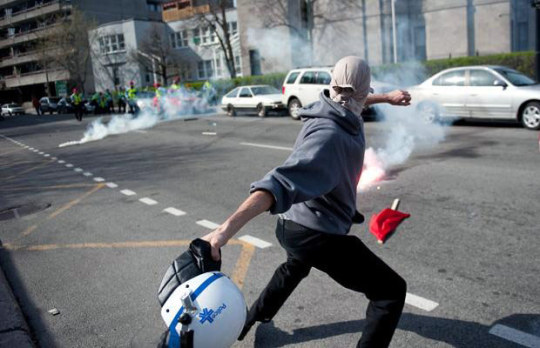
May 1, 2011 in Montreal.
2012
May Day 2012 saw powerful anarchist demonstrations around the world, notably in Montreal, Oakland, and Seattle.
In Montreal, at the high point of a powerful student strike, hundreds of participants in a fierce May Day demonstration clashed with police. The march started on the Champ de Mars, just in front of Montréal City Hall, and quickly moved towards the downtown core. It included one of the largest black blocs that had taken the streets of Montréal at that point—perhaps 300 strong.
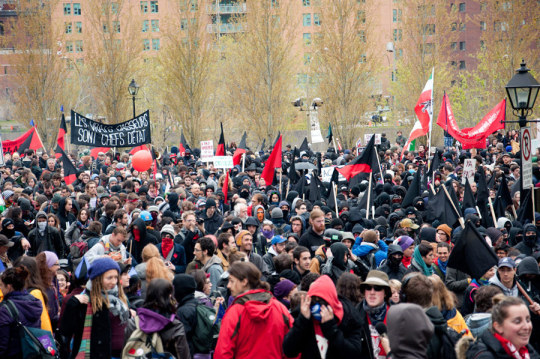
A portion of the crowd assembled for May Day in Montreal as the demonstration leaves the Champ de Mars.

May Day 2012 in Montreal.
vimeo
March and clashes in Montreal, May Day 2012.
In Oakland, after a night of vandalism throughout rapidly gentrifying neighborhoods in San Francisco, hundreds marched across the city, beginning and ending the day by clashing with riot police at Oscar Grant plaza, previously the site of Occupy Oakland.

San Francisco, the night before May Day 2012.

Facing down the police in Oakland on May Day 2012.

March through Oakland, May Day 2012.
In Seattle, a black bloc marched through town, unexpectedly attacking the Niketown famously damaged by demonstrators against the 1999 World Trade Organization summit. What had taken activists from all around the United States and the world to accomplish in 1999 was now carried out by locals despite the presence of large numbers of police.
youtube
Seattle May Day 2012.
2015
Several hundred demonstrators in Milan clashed with police in protests against capitalism, the state, and corruption around the corporate “Expo 2015.”

Milan, May Day 2015.

Milan, May Day 2015.

May Day in Turkey, 2015.
2017
To be continued!
24 notes
·
View notes
Text
6 Beautiful ‘Vidaai Moments’ From Real Indian Weddings That’ll Bring Tears In Your Eyes
New Post has been published on http://healingawerness.com/getting-healthy/getting-healthy-women/6-beautiful-vidaai-moments-from-real-indian-weddings-thatll-bring-tears-in-your-eyes/
6 Beautiful ‘Vidaai Moments’ From Real Indian Weddings That’ll Bring Tears In Your Eyes
Surya Sathya Narayanan Hyderabd040-395603080 September 5, 2019
Open your social media page, and start to scroll. Every other friend out there is getting married. And, that comes as no surprise. Marriage season is on. Pictures of flowers, decoration, colors, and most importantly, emotions. A multitude of emotions.
It is not merely a matter of grandeur, fun, and frolic. The wedding is an event that marks the transition of one’s life. And, at the end of that very day, the couple is pronounced “man and wife”. Of all the rituals that form a part of Indian weddings, one of the most emotional moments is that of the vidaai.
For those of you who do not know what vidaai is, here it is.
Vidaai, as a practice, started back in the time of king and queens, when the brides were considered as a property, gift or compensation when there was a treaty between kingdoms or a surrender. In these weddings, the vidaai takes place in the end when the bride bids farewell to her parents and departs to her husband’s house. Just the way the tradition has been followed for so many years so has the emotions that come with it.
We present to you six pictures that are filled with emotions from the vidaai at Indian weddings.
#1 Eyes Filled With Dreams
aishwaryabidri_ / Instagram
The final moment of a wedding. Although the vidaai is merely a symbolic way of breaking old ties, her heart is filled with hopes and dreams of the future. Not just her. The family is filled with the hopes that their girl will step into a life that will make her life happier and fulfilling. In this shot, the bride is assuring her family that everything is going to be alright. Irrespective of her emotions, it definitely seemed like the right way to tell her parents that life will get better and she will be happy.
#2 A Silent Tear
dreamy_weddingday_ / Instagram
It is not easy to leave the family that you spent a lifetime with. Parents, siblings, and if you are from a joint family, it could be a whole lot of people that you have seen every morning when you wake and every night before you sleep. The bonding, fun, and memories are irreplaceable. Irrespective of whether it is an arranged or love marriage, the emotions are the same. And, this shot depicts that beautifully. A silent tear, the dreams of a new life and the pain of leaving a lifetime of known faces. Everything in one single frame.
#3 Wishing The Parents Well
nikhilkapur / Instagram
The most important stakeholders in a child’s birth, growth and development are the parents. Along these lines, when the daughter leaves home, it is not merely emotions and memories that she leaves behind. Every daughter leaves behind a prayer for the parent’s health and prosperity. As a symbol of this, the bride throws back rice and coins over her head, and the parents hold a cloth behind her to collect it. The coins imply wealth, while the rice symbolizes health. While this is just one belief associated with the ritual, there is another one that recognizes the rice throwing as a symbol of the bride repaying her parents. And, with that, she leaves the wishes that her beloved parents have a healthy and prosperous life even after she moves away.
#4 Bidding Farewell To The First Hero
witty_wedding / Instagram
For every kid out there, the father is the first hero. The protector, provider and everything else. This emotion is definitely a lot stronger for girls. “Daddy” is usually the one that sets the benchmark for the man that comes into her life. From looking at the world from his shoulders to holding on to him during her lowest. It is never easy leaving his safe arms to enter a whole new world. And, this shot shows just that.
#5 The Bond That Never Leaves
prismlens / Instagram
True. The heart of vidaai is the bride. However, it would not be what it was without the parents. One cannot begin to explain the impact on them after their little girl leaves. And, if it is the only child or only daughter, the emotions are a lot stronger. After all, it was their little princess that has now turned into a queen. When the bride is leaving for her new home, the parents have only each other through thick and thin. This shot is a perfect depiction of the teary-eyed parents with high hopes for their daughter’s future.
#6 The Partner In Crime
brides_special / Instagram
While parents hold a strong place in a girl’s life, there is another relationship that cannot be undermined. Having a sister is like having a partner-in-crime for life. And, the emotions increase multi-fold if she has a brother. The brother acts as not only a partner-in-crime but a guardian. Often, he takes over the father’s role in setting the benchmark for her future partner. And also, a brother plays an important role in pampering a sister, especially is she is the younger sibling. This picture captures the emotions between the bride and her brother.
Although times have changed and technology has brought people together, it is clearly not good enough to help people convey all of their emotions to each other. That is probably one of the reasons why no matter how close you are virtually, home is where the heart is. What do you think about these shots? Share with us your favorite vidaai moment in the comments section below.
The following two tabs change content below.
Latest posts by Surya Sathya Narayanan (see all)
Surya Sathya Narayanan
RELATED ARTICLES
Source: https://www.stylecraze.com/trending/vidaai-moments-from-real-weddings/
0 notes
Text
Thin Ice
Latest Review: Doctor Who - Series 10, Episode 3: THIN ICE STARRING: Peter Capaldi, Pearl Mackie, Matt Lucas WITH: Nicholas Burns, Asiatu Koroma, Simon Ludders, Tomi May, Guillaume Rivaud, Ellie Shenker, Peter Singh, Badger Skelton, Austin Taylor, Kishaina Thiruselvan --- Written By: Sarah Dollard Directed By: Bill Anderson Produced By: Peter Bennett Executive Producers: Steven Moffatt, Brian Minchin First Shown on BBC 1 - 29th April 2017 NB - This review contains a plethora of spoilers (based on a Preview Edition of the Episode). The TARDIS has suddenly decided to take Bill and The Doctor off course. Both the precise location in England and the temporal zone are different to what was hoped for. Having been to the future of mankind, the ages-old academic and his youthful student find themselves instead in Regency London. It is a time of great development and industry, but also one where the slavery trade is in full swing. Many orphaned children struggle for survival on a daily basis. The Thames has been frozen over and this has led to a large-scale market being set up on the ice. However, warning signs have (barely visibly) been laid out, so as to remind people of the ice being less sturdy in certain regions. And this is with good reason. People have begun to disappear, and it would appear there is a connection to some un-natural green lights that can be seen through the frosty surface. Eventually the Doctor and Bill have to investigate in-depth, and some hard truths come to bear. For the first time, their relationship faces a test. But perhaps in facing a very human, very cold, monster in the form of Lord Sutcliffe, they can continue to function as a partnership of universe-weary wisdom, and fledgling careless brilliance. --- This story continues to see the 2017 sequence of Doctor Who in fine fettle, and assure viewers that soon-to-depart Peter Capaldi is now producing some of his best form (as opposed to phoning it in for a nice pay check and exposure via prime time scheduling). By now it is standard practice that the first two adventures proper for a companion of the Doctor, after the season opener, see a quick succession of the past and future. (The order tends to fluctuate, depending on the season in question). With these second and third episodes, at least there is a small change-up, utilising the secondary companion (as played by a confident Matt Lucas). The framing device of Nardole scolding the Doctor for going off world - which indeed is true for the events of Smile, if not technically this third adventure - is nicely done, and also includes a hint of what the Doctor and his part-robot-part-humanoid friend are guarding back in Bristol. Sarah Dollard came up with a wonderful debut story last series, and provided a most memorable official demise for Clara Oswald, with Face The Raven. This story is not quite up on the same level, and continuity-wise is not a game-changer. However, the many virtues of world building and characterisation are all present and correct, once again. Virtually all the on-screen players who end up as nutrition for the aquatic alien being are sketched out effectively - even if they have rather limited screen time to work with, due to the primary character development being devoted to our two regulars. This episode often makes no attempt to hide how it takes inspiration from previous stories in Doctor Who's lore. The Doctor advising Bill how to get to the wardrobe is a reminder of (the un-transmitted but frequently adapted) Shada. After the Doctor and Bill begin their explorations proper, the TARDIS pinpoints the size of the being under the ice, and also how much danger it poses, which is a faint echo of the ending moment of 1963's very first Who serial. More recent use of past convention is found in the use of the sonic screwdriver and psychic paper, with the former in particular driving the earlier parts of the story forward. Possibly even more so than prior episodes this year, the main heart of Thin Ice lies in the Doctor and Bill continuing to establish a working partnership together. Whilst the Twelfth Doctor noticeably ‘softened’ over the course of Series Nine, he still retained some darker edges, and these are particularly conspicuous at times. The cold manner in which he retrieves his sonic screwdriver from both the doomed Spider, and later one of Sutcliffe's thugs, leaves Bill repulsed and shocked. Noticeably she feels horror, irrespective of the actual personal qualities of the person who could not be saved from their fate. The Doctor also deciding to be far more mysterious (certainly when compared to his Ninth and Tenth incarnations) over how he has had to make difficult choices when saving people, and also when to kill, is a very nicely-played scene by Capaldi and Mackie. True, it could easily appear in any given episode at any opportune time, and is not necessarily dependent on the story surrounding it. But it still is fine work from the writing/production team, and of course the main praise should be reserved for our two lead actors. And in general, the Doctor is showing hints of his rather less personable qualities, which most of us have come to associate with his maiden season in 2014, rather than the somewhat breezier persona that crossed the airwaves on a weekly basis two autumns back. He is blunt to Peter Singh's 'Pie-Man' on their very first meaning, going so far as to undermine the legitimacy of the man's livelihood, back in a time of Earth history where ethics and truth did not have the same priority they do today. And whilst it is meant to be humorous for the audience (in a very knowing Roald Dahl fashion), his description of the lost children as being on the "menu", is indicative of his grim acceptance that the alien being simply is higher on the food chain than humans, regardless of whether it should belong in the Thames river in the first place. But there are plenty of lighter/warmer sides to our title hero too, with the mention of a magic wand being a reminder that whilst Doctor Who is officially a sci-fi show, in many respects it takes sustenance from traditional fairy tales and legends. The very first actor to play the role on TV, William Hartnell, once described the main character as a combination of a Wizard and Father Christmas, and his point still stands many years down the line. Also, the quiet little scene as the Doctor tells a 'bedtime' story to some of the orphans is beautifully played and directed. Suddenly the moral dilemmas are secondary, and all that matters is a wise man with grey curls, presenting a narrative with conviction and gusto. Come the end, as the remaining survivors find themselves fortunate to have a wonderful new property in which to live, there is a knowing look from the Doctor and Bill acknowledging that the deeds must be in the name of a male heir. Yet if the time-travelling genius could bend the law and change history to allow the charming Kitty to have the privilege of being the next in line, then he would. It is a moment that has huge impact on anyone with a semblance of heart and soul in them. Bill continues to put hardly a foot wrong, whether in terms of connecting with the audience or being acted authentically by the (comparatively inexperienced) Pearl Mackie. Along with other examples given here, there is a lovely moment where the Doctor's favourite student is overcome with wonder that she can walk on the Thames. Whilst the famous river is a great visual motif, it is also not associated with being crossed without the help of a vessel, and is heavily polluted. Later, when it is made clear what the villain's key motivation is in terms of the energy source he is obtaining, a very funny (if naughty) joke is made as Bill reacts point-blank. The full phrase would not pass the censors for a show like Doctor Who, even if movies shown even earlier on other TV channels get a free pass, but by being so coy in doing a quick edit, the effect is markedly pronounced. (And furthermore, another continuity echo is made, in terms of Rose teasing Cassandra, back in Series Two's opening story). The ending of the story is probably the most fully satisfying for the show in some time, with perhaps the last such occurrence being the conclusions of Heaven Sent and Hell Bent. Whilst perhaps simplistic, it is elegant and uses the decision to give just enough explanation via rapid editing, and travelling forward to the present day, with an archive newspaper article being knowingly referred by the Doctor. He often realises that sometimes an abridged account of the whole truth is for the best. That the ostensible monster of the story is not judged guilty of any wrongdoing, and is merely manipulated by Lord Sutcliffe, is welcome too. And show runner Moffat clearly has decided to steer away now from the overused 'everyone lives' trope. The good, the ambiguous, and the dastardly all firmly remain dead and buried. Thus, the Doctor's quiet admittance to Bill of the limits of his power to save people is not compromised in the final stanza. The episode also looks very impressive. The scenes underwater are built up to in a suitably suspenseful manner, before the efficient SFX work comes into play, accompanied by some of Murray Gold's best use of more subtle musical dressing. This ensures the core of the story is strong. Sometimes going into the murky depths of the aquatic can be a pace killer, but not here thanks to the decision by Bill Anderson to emphasise mood and uncertainty in the earlier sections of the story. Elsewhere on ground level many extras are used, along with ‘convincing’ animals in the background, and props galore. There is a sword swallower, some play fighters, and countless other novelties. Never for a moment does it not feel like the capital city of England developing at a fast knot, back in the time of the Regency era. So far, the show has done fine work in establishing who Bill is, by giving her plenty of character and plot-relevant material, this latest instalment very effectively addresses her attitudes to sci-fi itself, and more significantly to her identity as a woman with a mixed ethnic background. The character material on Bill being something of a sci-fi fan herself is mostly played as light-hearted self awareness, which is so indicative of Steven Moffat’s general style – both in Doctor Who and in his many other TV (and film) projects over time. Asking the Doctor to clarify if they are on a parallel world, and just why he calls his sonic screwdriver that name are amusingly played out in dialogue. However, the more worthy focus on attitudes of mankind concerning 'race' is made into a significant part of the story. Having the Doctor and Bill trying to integrate as best they can feels more important than in other episodes where the setting is simply pure fantasy/ sci-fi in nature. For the young lady from the 21st century England, there already is likely one too many a memory of being treated as inferior for the way she looks. To suddenly be back in her own country at a time when slavery was acceptable (be it of women, foreigners, those of 'other races', or even children) is a major jolt, and she immediately makes an effort to dress up so as to fit in, but clearly wishes this was not a requirement. And of course, eventually even that change of attire is not enough to stop a bigot from verbally abusing her. The man in question is Lord Sutcliffe, and this main villain for the episode is not a pleasant person in many respects. He seems utterly without empathy, and has a detachment about his overall operation, even if the end result would see him become richer (and thus more powerful) still. However the denigration of his ‘inferiors’ who do not share ('enough of') the same bloodline as him remains the most deplorable aspect. Whilst the Doctor and Bill manage to set time 'right', the story very quietly yet noticeably makes a point that the evil of slavery is something mankind must realise over time is wholly wrong. I have few real complaints with the basic narrative. It does in principle echo many episodes of yesteryear – something probably inevitable given how far the series has been in existence – but is never executed in anything less than an enthusiastic manner. Nonetheless, a general issue I have had with Series Ten again crops up here. We have at least one moment for the audience being ‘spoon-fed’, when the distinctive hat of Spider (the thieving little boy who could not be saved) is seen as rejected by the monster in the depths of the Thames, along with quick flashback of his thieving of the sonic device the Doctor so prizes. This reminded me of the repetition used concerning Heather meeting Bill on a night out, when the original image was already striking enough in how it was shot to resonate with the viewer. Perhaps though, exposition and clarification of the mystery does not quite verge on being so heavy-handed, as during the scenes in Smile where the TARDIS duo found out the whole truth behind the dilemma they were presented with. I mentioned Sutcliffe as serving the themes of the story well, but as an actual genre villain, he is rather middling overall. Whilst certainly played competently by Nicolas Burns, in that the audience is made to firmly dislike him, he also is very much out of his depth. The screen time afforded him is neither used efficiently enough to give us truly involving motivation and back story, nor abundant enough for him to be memorable in the viewers' minds after the episode has concluded. Sutcliffe's henchmen are never made into anything too chilling or threatening, but still have enough dialogue and commitment in the performances to convince viewers that they could have come from the criminal underworld, and are making the most of an employer with more money than most others. Dollard still does fine work with the villains, in terms of presenting the more corrupt and deplorable aspects of British society at the time, where gaps between the so-called upper and lower classes were wider than any cracks in the river's ice. However, the performances of the children are uniformly terrific, which is pleasing to see after Smile had a winning turn from Kaizer Akhtar. When the Doctor needs some exposition from the locals, it is the orphans who whole-heartedly give him the information he requires, and the story smoothly advances as a result. Furthermore this authenticity of portraying urchins who barely are able to keep themselves fed really helps the end of the episode. As the alien creature emerges from its 'prison' and is displayed in full, top-quality CGI glory, there is a great moment as Bill admires how it looks and is able to forgive it for being a killer. But the best part of the satisfying resolution is seeing the Doctor restore the barely surviving orphans to a place of safety – one far grander than any could have dreamed of. The wink in the eyes of both the Doctor and Bill as they turn the class expectations topsy-turvy, really helps this become a ‘punch-the-air’ moment. And it would not have been nearly so effective, if the children had not been as fully breathed to life in the performances by these youngsters. As good as our leads are here, and I expect even better work in the ‘bigger’ episodes to come, the main praise should be reserved for the quintet of Badger Skelton, Asiatu Koroma, Austin Taylor, Kishaina Thiruselvan, and Ellie Shenker. --- OVERALL ASSESSMENT: Series Ten's third individual story stands up well, as a very enjoyable outing in the early 19th Century. It is thoroughly watchable, whether the viewing takes place on a Saturday evening (as per tradition), or via a streaming device that does not have to be fixed down in a given time and place (like the TARDIS herself). And the icing on the cake? A snappy preview that sees the definitive Poirot actor – David Suchet – making a guest appearance, to potentially lend the hyperactive Time Lord some pearls of wisdom. http://reviews.doctorwhonews.net/2017/04/thin_ice.html?utm_source=dlvr.it&utm_medium=tumblr
0 notes